#also hateful towards any other queer who has more complex identities and attractions
Text
That awkward moment when you are like 'AM i lesbian?' but then you remember lesbian community and you just 'ah no gotta figure out what else can i be'.
#i think i am leaning more into bi lesbian#but fuck lesbains are so fucking hateful#i was so used to how open and welcoming aroace community is#(triple a's RULE xD)#i arent touching this wasp nest#like 'lesbians are nonmen to nonmen love. call yourself sapphic that is women to women love'#like how does this make sense??#also WAY to be queerphobic to older generations where lesbians and bi were waaay closer#also hateful towards any other queer who has more complex identities and attractions#also also i thought sapphic is like... a relationship?#trans label is also an umbrella gay label is also an umbrella but lesbians?#nah they are too pure ugh gross
6 notes
·
View notes
Text
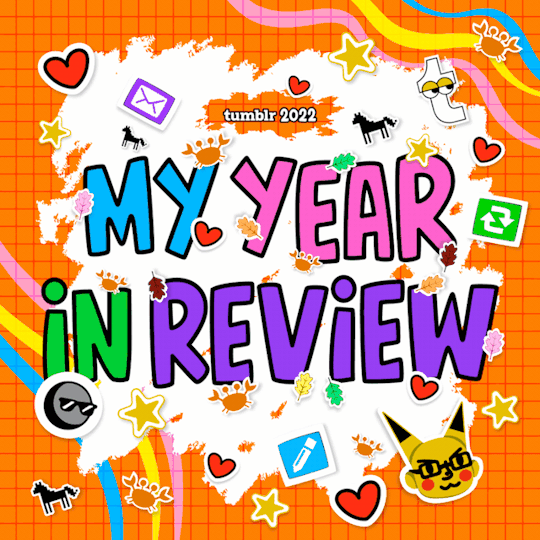
I posted 821 times in 2022
That's 821 more posts than 2021!
69 posts created (8%)
752 posts reblogged (92%)
Blogs I reblogged the most:
@genderkoolaid
@queer-love-4-women
@genderpunks
@gay-otlc
@aholotte
I tagged 784 of my posts in 2022
Only 5% of my posts had no tags
#trans pos - 61 posts
#the owl house - 58 posts
#queer facts - 53 posts
#the posts ever - 52 posts
#witch hat atelier - 42 posts
#queer pos - 35 posts
#lesbian pos - 35 posts
#pokemon - 28 posts
#mspec lesbian pos - 28 posts
#lgbtq - 28 posts
Longest Tag: 137 characters
#garfield is irredeemable media because he’s mean to odie and this means that the author hates dogs and if you like garfield you hate dogs
My Top Posts in 2022:
#5
being mspec doesn’t always mean you like all genders!!! all it means is that you like more than one gender. you could be mspec and like women and non-binary people. some of y’all treat non-binary people like women-lite or men-lite and it shows
74 notes - Posted October 5, 2022
#4
I love trans people
I love trans women, trans men, transfems, transmascs, non-binary people, agender people, genderfluid people, multigender people, transsexuals, trans intersex people, gnc trans people, trans people of color, religious trans people, disabled trans people, dysphoric trans people, nondysphoric trans people, everyone under the transgender umbrella
You have the right to express yourself the way you see fit.
You have the right to take up space wherever you feel like
You have the right to speak on issues that affect you
You have the right to tell people you’re trans, or to wait to tell people. No one should be outed against their will
You have the right to get any medical procedures you want/need
And transphobes, exorsexists, Exclusionists, infighters, and anyone who feels like they should decide your identity for you or exclude you from their space has the right to shut the fuck up :)
Even so, love trans people more than you hate transphobes
91 notes - Posted November 2, 2022
#3
STOP SAYING “NON-MEN” AND “NON-WOMEN”
Key words so this shows up on the Google algorithm: "non men loving non men" "non men attracted to non men"
This is the only time I’ll say this, but queer people online need to stop saying “non-men” and “non-women” these phrases create yet another binary and expects everyone to fit in a neat little box. Worse still, these phrases are inherently antiblack, homophobic, and dehumanizing. Not to mention that “nonmen” makes trans/nby people into “other” and ends up centering men anyway. SOURCES (alt text included)

“The term nonmen has remained something of a battleground within feminist theory and practice for quite some time as a label built on a negation and hence as always reactive towards what is being negated—which, in turn, remains the norm as what is being resisted. The term also makes explicit the painful friction between woman-centered feminism and trans-inclusive feminism, in relation to which binary gender has never made sense. As a point of departure for a political movement or event, the category aims to include not only cis women but equally trans and nonbinary bodies positioned as other in relation to the white, straight male norm”
See the full post
101 notes - Posted August 3, 2022
#2
on this fine Sunday morning we are appreciating loveless aros. they deserve all the praise imaginable
185 notes - Posted September 11, 2022
My #1 post of 2022
anyways I love mspecs and lesboys and turigirls and multigender people and cusper people and people with complex or contradictory identities and people with “outdated” identities and people with good faith identities that are put into the dni list of some asshole and queer people who aren’t “queer enough” for some people and “too queer” for others and who Queered Wrong and who don’t fit society’s expectations and anyone who lives their best life without caring about what discourse-addicted tiktok users have to say about their authentic identity and
381 notes - Posted October 13, 2022
Get your Tumblr 2022 Year in Review →
3 notes
·
View notes
Text

How did it all start, the erasure of bi people in law and politics, even by the LGBTI-rights movement itself? With bis actually comprising more of the LGBTI population than gays or lesbians, how did we come to be made so invisible, even within LGBTI-rights discourse?
The “how” and the “why” are two separate questions. The “why” is eloquently (although in dense academic language) tackled by Yale Law Professor Kenji Yoshino in his article, The Epistemic Contract of Bisexual Erasure. Yoshino’s article describes in detail the driving forces, both benign and not, of bi erasure. As with many things, it may come down in large part to insecurity: people are threatened by what they don’t understand, and by realities that threaten their rigid paradigms.
For example, Yoshino explains, gay and straight people find some comfort in being able to identify sexual orientation on sight: if one sees a same-sex couple, one can safely assume the members of the couple are gay, and if one sees a different-sex couple, one can safely assume the members of the couple are straight. Except that the existence of bi people renders such assumptions not so safe at all, but rather, fundamentally flawed. Which makes both gay and straight people uneasy, for not dissimilar reasons.
As Yoshino and many others have explored over the years, there are other more complex factors at play as well driving bi erasure. But, leaving the “why” aside, the “how” it all plays out is a bit more straightforward (no pun intended). This article gives a brief snapshot of at least some of the history of bi erasure in LGBTI-rights political discourse. The next article in this series will give a parallel snapshot of how that bi erasure has evolved in LGBTI-rights legal discourse more specifically.
To preface, “gay”, “straight”, and “bi” are all relatively new identities. Since the beginning of time, in every culture, it is likely that people engaged in homosexual or bisexual conduct, without sexual orientation labels being attached to that conduct. For example, Plato’s Symposium can be read, in part, as describing the sexual fluidity of an ancient Greek society in which men often had male lovers in addition to their female wives. But the ancient Greeks didn’t use the ancient Greek equivalent of “gay, straight and bi” identity labels (although the Symposium’s stimulating lover/beloved dichotomy is a binary of another sort). The word “bi” was no more included or erased from discourse in those days than “gay” or “straight” was.
It was only when “homosexual” and “gay” became common labels in modern society that the comparative absence of “bisexual” and “bi” from political discourse became apparent. Rather than the label “homosexuality” applying only those with solely same-sex attractions, those who had both same and other-sex attractions also got swept up in the “homosexual” label rather than being acknowledged as “bisexual”. In other words, “homosexual”, and, eventually, “gay”, evolved as the default labels in political discourse for everyone who engages in same-sex intimacy, whether or not they also have different-sex romantic partners and attractions.
Even Alfred Kinsey’s influential research in the 1940’s–which revealed how fluid sexuality is and how uncommon it is for people to be unwaveringly homosexual or heterosexual–was bi-erasive in terminology even while being positively bi-revolutionary in its impact: Kinsey himself disliked, and did not employ, the term “bisexual” as a label describing bi-sexual orientation.
Bi invisibility and erasure to this day is pervasive in political discourse as well. For example, despite lobbying from bi activists, LGBTI-allied legislators and even many LGBTI-rights groups still insist on using the titles “Gay Panic Defense Ban” or “Gay and Trans Panic Defense Ban” to describe legislative efforts to ban those who commit violence against LGBTI people from defending themselves on the grounds that they were provoked by the victim’s sexual orientation or gender identity. As ten-year old Anthony Avalos would attest, were he still alive to do so, being brutally murdered for being queer is something that happens to bi children too. Although The Advocate, with unfortunately bi-erasing inaccuracy, reported he was killed for coming out as gay after saying he liked boys, the full story is that Anthony was beaten to death, allegedly by his mother’s boyfriend, for coming out as bisexual and saying he liked boys and girls.
Just as Anthony’s bisexuality, the very reason for his brutal murder, was erased by a prominent LGBTI media source, so is the broader reality of violence against bi people every time the LGBTI-rights movement pushes legislation that includes only gays and trans people in its name, not bi people. It has been, so far fruitlessly, pointed out to those who insist on omitting “bi” from the “gay and trans” titles of such legislation (if not, thankfully, from the bills’ legislative protections) that such bi erasure is both inaccurate and harmful to bi people, who suffer disproportionately high rates of violence and hate crimes compared to even lesbians and gays.
Sadly, the response to the call for bi-inclusivity in naming LGBTI-rights legislation has been a collective shrug and half-hearted justification that this is just the way the bills have always been titled (although they haven’t; they’ve evolved from “gay panic” to “gay and trans panic”, so why not evolve a bit more, to “LGBTI panic”?).
Change is hard, so it is said. But being excluded by name from protections from hate violence, having our very existence erased by those who are supposed to represent us, is harder. It’s not too late to start being inclusive of the bi community, and, in the process, more accurate about the demographics (and honoring of the lives) of those who are victims of violence because of their sexual orientation or gender identity.
Panic defense ban legislation is just one of many contexts in which bi people have been omitted from the titles of legislation. The good news, and bi people should take this to heart, is that the actual text of these bills does protect against sexual orientation and gender identity discrimination broadly, which applies to bi people and other queerfolk alike. Which just begs the question: if the actual substantive text of laws can be written to be bi-inclusive, why can’t the titles of the legislation as well? It’s not such a big ask.
An even more important policy ask, that has been made over time by members of the bi community, is for bi people to be not just acknowledged, but counted in our own right in research and the collection of data that determines the allocation of resources to communities in need. This, and other bi-aware policy protections for bisexuals that are solely needed, would go a long way toward protecting the bi community, the largest but least politically acknowledged group within the LGBTI movement.
To solve the problem of bi erasure in LGBTI-right discourse, policy and politics, it will help if more out bi lawmakers are elected to office (such as Congresswoman Kyrsten Sinema, who has a shot at advancing to the U.S. Senate this fall). But it doesn’t seem that bi legislators are going to flood the state capitols or advance to Congress in great numbers any time soon. So in the meantime, we desperately need our own community — the broader LGBTI rights movement, LGBTI media, and LGBTI-friendly legislators — to step up, hear our voice, and say our name.
#bi tumblr#bisexuality#lgbtq community#bi#lgbtq#support bisexuality#bisexuality is valid#lgbtq pride#pride#bi pride#bisexual#bisexual history#bi history#bisexual community#support bisexual#support bisexual people#bisexual injustice#biphobic gay people#biphopia#biphobic#bi erasure#bisexual erasure#bisexual facts#bisexual info
53 notes
·
View notes
Note
Why do you think it’s okay to write a representation of a country as a trans and homophobic person when they’re supposed to represent ALL of their population? LGBT+ people suffer in Russia, and making the rep of their country hate them is offensive. Also, your transphobic threads need to stop. It’s just painful to watch.
Thank you for your honest feedback! It’s really useful for me to hear how it’s being received (impact over intent.)
If you care to read more, I’ll be putting some of my intent under a readmore, but since it is bothering the community, I will cease creating content about those issues.
If you’ve found my content triggering or would like to receive support related to LGBTQ+ discrimination online, there’s a bunch of resources here: https://www.glaad.org/resourcelist
As well as the TREVOR project hotline, which isn’t only a suicide hotline- you can call them for urgent support needs as well. They also have online chatrooms, text lines, and forum spaces to give and receive support. Read more at https://www.thetrevorproject.org/
Ivan is a bisexual man, so anything he expresses against the LGBTQ community is also something he’s holding against his personal self. The subjugation queer people face in some parts of Russia isn’t something I thought someone like canon Russia would choose to stand against via being socially active and out-and-proud, especially in the way he handles conflict through intimidation and threats before all else. So, while making this muse, I decided that he would be effectively stuck in the middle of those two worlds.
What leads me to have him express a level of homophobia is him having a big collection of interpersonal anxiety (read: coercive ways of communicating, abandonment fears, deep feelings of inadequacy) that he uses to squash or invalidate or attempt to suppress what he feels towards men. When he deals with women, he continually appraises the situation and himself through a lens of aggressive and polarizing sense of what is “masculine.”
As the muse developed, I became able to name patterns in how I was writing him that suggest mental illness— yes, that’s related to why he’s homophobia/transphobic. This muse is a person who has remained somewhat steadily resilient, but whose resources have dried up recently: effectively, he’s facing a lifetime of absent or otherwise poor interpersonal relationships all at once as well as projecting stigma about what it means to struggle this way onto himself. The stigma around mental health in Russia can’t be ignored either, and is constantly battling with what little self-esteem he has left. If he weren’t a nation, the level of neglect he experienced could have stunted his neurological growth, and it’s only the ability to absorb knowledge through a large number of people through mystical means that led him to be able to operate in a semblance of normalcy.
I work hard that any inclusion of transphobia isn’t a denial of identity, because Ivan does understand that level of the trans experience of being ____. Most of his comments are lack of education-type deals (and it’s no one’s job to educate him, but he is not educating himself or engaging in a lot of queer spaces for fear of retribution and simultaneously as a form of self punishment) like thinking of gender in a binary, referring to personal traits as gendered, deadnaming when referring to someone’s past… things that you learn quickly on queer platforms like here and TikTok and maybe even YouTube. Ivan is not engaging with those online communities, either. Even with interacting with nonbinary people, like he’s done in a few threads, he doesn’t question identity but he never seeks to expand his knowledge... he’s too busy shitting bricks about minor social conduct norms. His mental energy is going towards a state of psychological survival, not learning or connecting properly with other people.
Some people don’t think of things this way, but I like to think that nations’ metacognitive appraisal of why they’re holding an opinion cannot discern what is personal (like a specific memory of something that happened to them) or universal to their representative area (like certain folk songs Ivan can recall even without hearing them before, other pop culture, and publicly significant events like bread lines.) Ivan feels both the support within and around the LGBTQ+ community in Russia as well as the homophobia and queer erasure. Within his own experience set, he has to settle what it means to be a survivor of sexual assault and be attracted to people of that same gender and physique, and what it means to love another person when his idea of family is fundamentally coercive and rigid. People are complex, and we as humans lean onto attacking the other for a variety of reasons... I intended Ivan’s homophobia to clearly be about more than just the community it attacks, but I recognize using something like that, that causes real suffering and loss of life, as a theme that isn’t directly related to the betterment of human life within fiction can be exploitative and I apologize.
Now for the stupid sappy bit I didn’t want to write because it’s so backhanded to claim to like something that hurts other people: As a queer person myself, I’ve also found it personally useful to admit to Ivan’s homophobia and involve it in his thinking, since I can fight back at cisheteronormative assumptions I make in my own mind and become a freer person, but I understand now that my actions are harmful and I will reflect on them.
8 notes
·
View notes
Text
The Many Faces of the Strong Female Character
The much-requested, positive counterpart to my classic “Female Characters to Avoid in Your Writing” and it’s much-later sequel.
Here, I will discuss some of my favorite fictional ladies and what makes them work so well; given my rapturous love of women, there will probably be a sequel! In the meantime, I talk more about portraying female characters here.
Happy writing, everybody! <3
1.) The Warrior
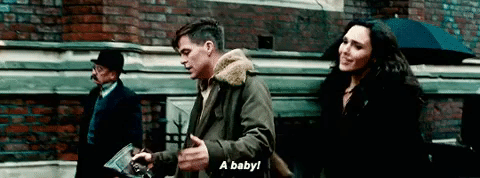
(Gif credit.)
When most people hear “strong female character,” they picture the most popular definition of the term: a stony-faced, emotionally shallow, conventionally attractive broad who punches and kicks stuff. She may occasionally shout things like, “I DON’T NEED NO MAN,” while perhaps punching a small baby.
I decided to start with my wife Diana, because she is the perfect antithesis of this trope. She isn’t stony, she’s courageous. She’s unabashed about showing her doubts, hopes, affections, and optimism. Her love interest never steals her spotlight, but she feels no need to shun romance to appear “strong.” She’s beautiful, but not sexualized or objectified.
And while most Strong Female Characters™ are ironically reduced to damsels in distress at some point in their own narratives, Diana consistently takes the lead, totally autonomous over her own story.
You can kick ass AND love babies, people. Joss Whedon, please take notes.
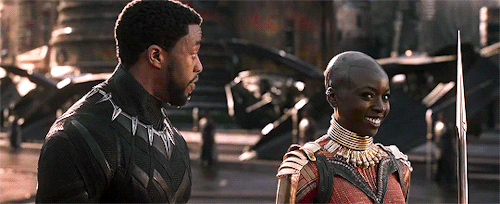
(Gif credit)
Other examples: Okoye from Black Panther, Furiosa from Mad Max: Fury Road, Rey from Star Wars, and Ser Brienne of Tarth from Game of Thrones.
2.) The Comedian
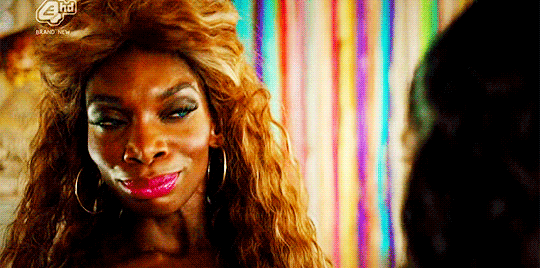
(Gif source)
If you haven’t watched Chewing Gum on Netflix, stop whatever you’re doing and watch it right now. Its relatively simple premise – a twenty-four-year-old from a fundamentalist Christian household struggles to lose her virginity – is a segway into a hilarious, genuine exploration of human sexuality, relationships, and how we forge our identities.
Brilliantly portrayed by the series’ creator, Michaela Coel, Tracy is essentially that one friend who knows exactly what you’ve been thinking and isn’t afraid to say so. She is never relegated to a single trope or stereotype. She’s stumbling, clumsily but enthusiastically, through the life experiences that shape us. Most importantly, she is allowed to be sexually curious, awkward, aggressive, insecure, and – I can’t stress this enough – hilarious. The dialogue is infinitely quotable, and endlessly relatable.
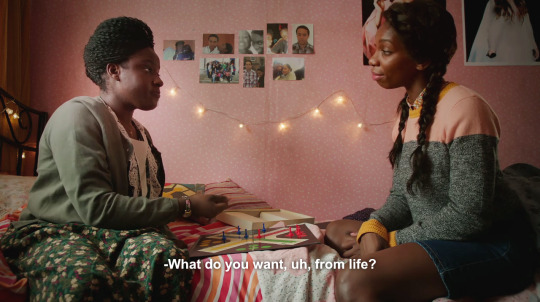
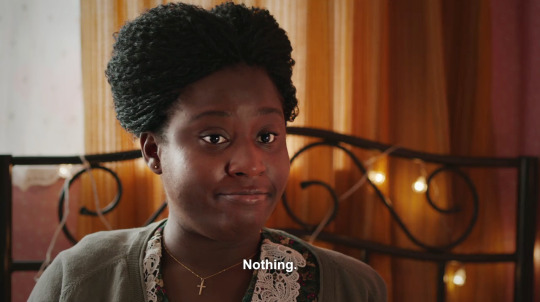

(Image source)
Watching shows like Chewing Gum makes me realize how few female characters – and even fe wer Black female characters – are portrayed as truly human. Typically, they’re allowed to be sexy, but not sexual. They’re allowed to be awkward, but only if it’s cute. They can be insecure, but only if that insecurity can easily be solved by the affirmations of a male love interest. And they’re rarely allowed to be the main source of a series’ comedy.
So remember: let your female characters be human. Let them be awkward, funny, sexual philosophers. It’s easier than you think.
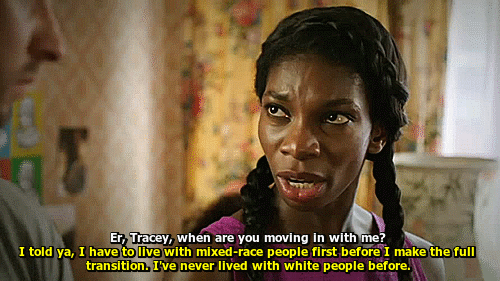
(Gif source)
Other examples: Abbi and Ilan from Broad City, Leslie from Parks and Rec, Tina from Bob’s Burgers.
3.) The Drama Queen

(Gif source)
Watching Riverdale is like hurtling along on a structurally unstable rollercoaster. It’s utterly insane, a lot of fun, and once you’re on, you can’t stop.
But amidst the explosions of batshit crazy plot points, killer cults, and the existential perplexity of finding yourself attracted to emo Jughead, there are some real gems. One of these is Cheryl Blossom, and pretty much every plot line surrounding her.
Cheryl is introduced as a fairly one-dimensional, catty mean girl, though the Regina George-esque charisma with which she’s portrayed makes her instantly likable. Initially, we expect her to be a character we’ll love to hate.
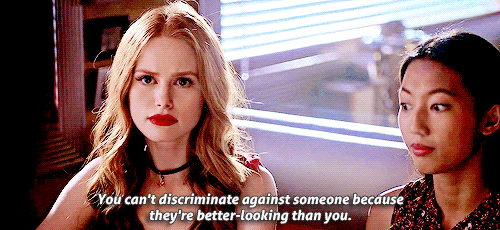
(Gif source)
And yet, within the first few episodes, I was impressed by how layered and complex her motivations were. Much of contempt towards others was misdirected rage from an upbringing of extreme emotional abuse, and grief over her dead brother -- all portrayed without a Snape-style condonation of said behavior. By the end of season one, my thoughts were generally, “Oh, crap, I don’t think I can claim to be watching this ‘ironically’ anymore,” and “MORE CHERYL.”
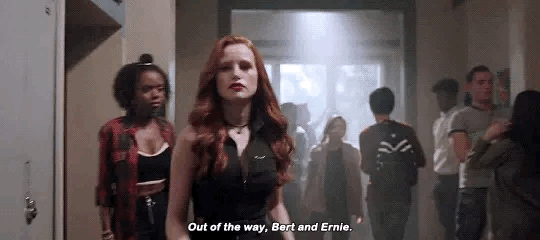
(Gif source)
Season two answered my wish, and then some. Cheryl was saved from an (impressively conscientiously portrayed) attempt at sexual assault by a pack of her female friends, and her attacker got the shit beat out of him in one of the most cathartic moments of modern television.
To the exaltation of my queer heart, she also came out as a lesbian, in a deeply moving story arc that I never would have expected from this show. Without spoiling too much, she and her new love interest kissing in front of anti-gay propaganda footage was legitimately one of the most powerful moments I have ever witnessed.

(Gif source)
Before the season was over, she viciously threatened her abusive, homophobic mother while covered in blood, shot a serial killer with a bow and arrow, and joined a gang. If that’s not gay culture, I don’t know what is.
Oh, how I wish this show was just about her.
Other examples: Alexis from Schitt’s Creek.
4.) The Lovable Bastard

(Gif source)
Ah, The Good Place. I have never experienced such a breath of comedic fresh air. A new philosophical principle each episode, examined and applied in hilarious and thought-provoking ways. A complete absence of harmful stereotypes. Incredibly lovable, three-dimensional, and ever-evolving characters.
I was considering using my queen Tahani for this list, who externally larger-than-life and internally vulnerable after emotional abuse by her parents. Also, she’s hilarious. Everyone and everything in The Good Place is hilarious. And I also thought about talking about Janet, who is the best character in anything ever, but of course:
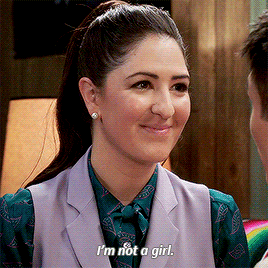
(Gif source)
Instead, I’ll be talking about bisexual icon Eleanor, who is something very few female characters get to be: the lovable bastard.

(Gif source)
Eleanor, when we first meet her, is not traditionally good in any sense of the word. She turned down a high-paying job because she was expected to be nice to people. She sold placebos to the elderly, and was great at it. She was drunken, slovenly, hedonistic, and selfish. And she’s instantly incredibly likable.
Why and how Eleanor is so enjoyable, even at her very worst, merits an essay all its own. But in a nutshell:
We empathize with her. We are introduced to “The Good Place” completely through her eyes. We are in her shoes.
The stakes are high. When we discover that her entry into the good place was a mistake, we want her to be okay.
We come to understand her, and how her terrible childhood shaped her destructive behavior.
She wants to be a better person, and with time, effort, and character development, we watch her become one.
Not only is this an amazing lesson in how to endear audiences to your character, it is also infinitely refreshing. The most famous lovable bastards are all men -- Han Solo, Dr. House, Captain Jack Sparrow, the Man With No Name, et cetera -- but women are rarely afforded the same moral complexity. If a woman in fiction has done bad things, she’s not usually a lovable bastard. She’s usually a bitch.
Eleanor isn’t just a great character. She conveys an important lesson: women are people. People with the same capacity for mistakes, growth, redemption, and love as anyone else.
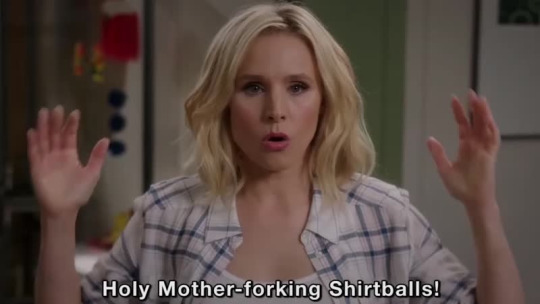
(Image source)
Other examples: Chloe from Don’t Trust the B*tch in Apartment 23
5.) The Cinderella
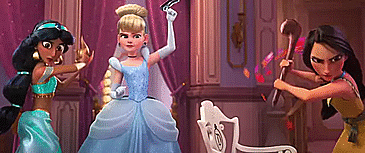
(Gif source)
Yep. I said it. Cinderella is a strong female character.
My girl not only survived in an abusive household, she persistently stayed positive. She worked each day to make the best of an impossible situation, from which she had no means of escape. That takes an insane amount of courage and tenacity.
But Caff, I hear you scream, she needed help to escape!! Well, my imaginary counterargument, so the fuck what? MOST people need help to escape their abusive situations, and there’s no shame in that. Accepting help from someone you trust is the best thing you can do in a situation such as that, and implying otherwise is horribly damaging to victims of abuse.
But she married the prince, you more feebly protest. Yes! She did! She found love and happiness and a great life in a socially influential position! And that’s an amazing message!
So in the flurry of female warriors, let’s not forget Cinderella, who tells people that their terrible circumstances won’t last forever, to stay hopeful and kind, and that accepting help from a trusted friend can lead to a happy life.
Cinderella is a bad bitch, and she deserves her happily ever after.
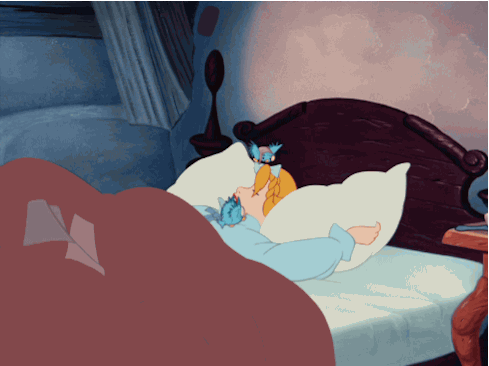
(Gif source)
Other examples: For some reason, I’m thinking of Sansa from Game of Thrones. When people try to discredit her as a strong character, they often make similar complaints. But both, quite fittingly, end up as queens.
#writing tips#writing resources#writing#caff's writing tips#female characters#strong female characters#analysis#wonder woman#okoye#chewing gum#riverdale#cheryl blossom#toni topaz#choni#the good place#eleanor#tahani#janet the good place#cinderella#sansa stark#gifs for ts#abuse mention for ts#assault mention for ts#long post for ts#gay characters#queer characters
5K notes
·
View notes
Text
We Are Who We Are Overall Thoughts *spoilers*
This review will be discussing briefly some of the episodes so far, so SPOILERS
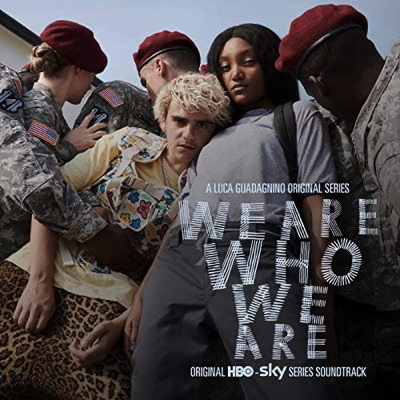
So I started watching the HBO original series, We Are Who We Are, and I am conflicted. When I initially watched it, the dialogue made it hard for me to enjoy it so I stopped. Then after a couple of weeks after its airing, I thought, what the hell? And this time, I was pleasantly surprised. I always maintain the belief that pilot episodes are either boring, messy, or just bad so I try to push past it in order to get to the good shit. The pilot for We Are Who We Are was...I’m not sure how to explain...different? It certainly wasn’t bad and it made an impression on me, but this show as a whole is hard to limit by just a few words. It’s really something that you should watch and experience yourself.
It was only after the first 3 episodes that I began to understand the tone and mood that Luca Guadagnino was trying to convey. A lot of the time, the dialogue is abrupt and choppy and can make no sense. It can be frustrating, especially when you have two characters that aren’t communicating effectively. But I think that was the point. Guadagnino is a very realistic director, he captures the most realistic elements in a film. A lot of the conversations between characters is meant to emulate real life. Like, what the hell do you say when a conversation becomes awkward? Well, nothing sometimes.
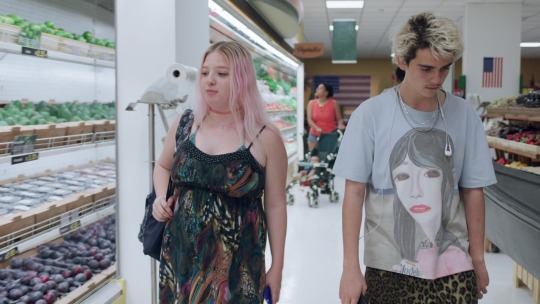
While Guadagnino’s typical cinematography may suggest whimsy, in WAWWA’s case the small structured and synthetic model of the military base is juxtaposed to the very concrete characters. When I started to view the show less as simply a televised airing of fictional characters and problems, and instead looked at them as people, I began to really enjoy it.
Take the main character of Fraser, played by Jack Dylan Grazer. Fraser is meant to be seen as an extremely complex and troubled kid, but the difference between him and every other teen in a coming-of-age drama is that he isn’t polished. His drinking and drug habit isn’t framed as romantic or beautiful, in fact most of the time it’s portrayed as his weakness of sorts. In the first episode, Fraser has one of his mothers drive him home after getting pretty wasted and Luca graces us with a direct shot of him throwing up. And before that, Fraser is stumbling on a bridge when he drunkenly falls and cuts his face. Everything the character does is messy, uncoordinated, yet extremely real and relatable. Hell, in one shot you can clearly see him do a Naruto run!
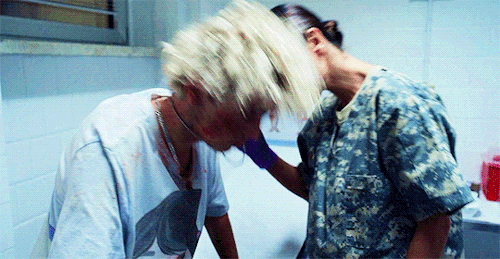
Caitlin/Harper is a character that I enjoyed watching, as well. Jordan Seamon did a fantastic job and I really connected with their character. Initially we see Caitlin as this mysterious girl, and in the pilot we are meant to assume that their relationship with Fraser is supposed to develop into a romantic one. This is not the case as it seems that Caitlin is trying to come to terms with who they are. The biggest shift in Caitlin’s character isn’t their friendship with Fraser but probably when they get their period.
This was a moment that even I related to, even though I am cis when I first got my period I didn’t tell my mom until the day after. The possible confusion and shift in their reality that Caitlin felt was only heightened with the conflict of their boyfriend wanting to be more physically intimate, and Fraser’s eventual discover of Harper. I would have like to see exactly why Fraser seemed drawn to Caitlin. I’m assuming viewers were supposed to think that Fraser is attracted to her, or something. But both Caitlin/Harper and Fraser are queer coded and their respective sexualities are alluded to not being straight. It would’ve made their standing as platonic friends more clear if this had been established stronger.
I definitely think the writer could have devoted more time to giving certain characters proper conversations. It would’ve given more development to certain characters and better context for things. However even without that, there is a lot that the audience is showed that can’t be told through dialogue. The power struggle between Sarah and Richard being one. So far, there hasn’t been any explanation as to why they have a such a volatile relationship other than Richard being a homophobe.
Through deeper inspection, I was able to interpret it as: Richard may heavily resent the fact the Sarah was promoted to Colonel and not him. It is never made clear who has the better credentials, Sarah or Richard, but assuming that she was the one promoted it is a safe guess. This may be highlighted by the fact that Sarah is a women, and also gay. Even before episode 7, it was clear that Richard did not respect her authority. I also interpreted it as Richard being upset that and openly gay women was promoted instead of him, a black man.
Of course this is just based on my own personal knowledge of how the U.S. military can be towards people of color and LGBTQ+. Regardless, the competitive tension between two parents is palpable without needing dialogue to explain.
When conflict happens, I can kind of figure out which characters are going to react and which one’s will stay silent. I think the show is trying to accomplish a drastically realistic and raw series. It took me while to adjust to it, but by maybe the 2nd or 3rd episode, it starts to grow on you. Despite not liking a good majority of the characters, I was very surprised by how invested I was in them.
Like, Danny is my least favorite character because he displays very abusive and explosive tendencies, and doesn’t seem to care about the world around him. However, getting glimpses into his character and seeing how Richard ignores him for Caitlin/Harper, his suicidal thoughts, and how he is trying to reclaim his cultural and religious background makes me empathize with him.
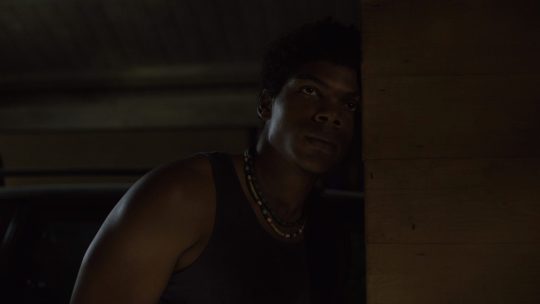
Even though I hate his character, I can see that he is struggling. I appreciate the way that this show freely shows dark skinned black boys dealing with mental health issues, and personal development. Rarely are issues like suicide talked about in the black community, so seeing Danny talk about it and Craig offering(admittedly poor)comfort was touching. This is a general vibe that I get from nearly all the characters on WAWWA. I also appreciated the how Danny is actively trying to convert to Islam. In shows, rarely is Islam ever portrayed in a positive manner. Especially when female characters are shown to be struggling with their religion, Islam is shown as this barrier that prevents them from living life. Hopefully it goes without saying that the “taking off the hijab” as a way to show that a female character is “liberated” is overplayed and does not offer any respect to the countless Muslim women who choose to wear hijabs.
Now I think the pacing of some of the storylines could have been handled a bit more gracefully. Like how we jump from Fraser and Harper being kind of enemies(not really but you know what I mean), to just them hanging out in Richard’s boat was jarring. I would have at least liked to see the scene of them talking on the rocks at the beach. It would’ve given more insight on Caitlin/Harper’s character and also on Fraser too. Also how quickly Maggie and Lu(Jennifer but I love the name Lubaba, it’s my aunt’s name)jump into a physical affair. I just would have liked to see a build up of tension between all these characters but I don’t think this entirely ruins the plot.
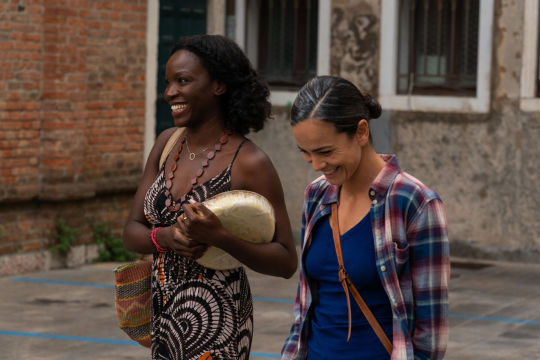
I was very iffy when I learned that the show would be focusing on trans identity and gender and sexuality, but not actually hire a trans male actor. I was afraid that the show would completely botch the experiences of being transgender, and honestly I don’t have the authority to speak on whether or not this affects the quality of the show. I am cisgender, and only can empathize with this particular situation as much as I can. But I would like to hear to the opinion of someone who is trans and elaborate on the ways that they did/didn’t like Jordan Kristine Seamón’s portrayal.
Now at the time I’m writing this, the season finale has yet to come out. But I’d also like to briefly discuss the most recent episode and how it developed Jonathan and Fraser’s relationship. I was VERY worried that Guadagnino was going to take their relationship in the direction of inappropriate. While nearly all the depictions of Jonathan and his actions have been trough Fraser’s pov, it didn’t stop me from side-eyeing some of the interactions they shared. Of course after it was mentioned that Jonathan was supposed to be in his late 20s, nearing 30 I was immediately uncomfortable with the very flirty behavior he exhibited.
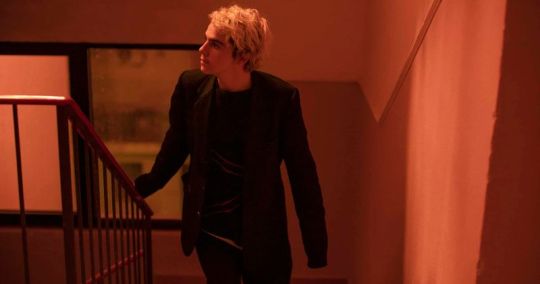
So when the scene of Fraser going up to his apartment after Craig’s death, I was very on edge. If Guadagnino had gone the extra mile to show an even larger age gap then I would’ve been pissed. While I enjoyed Call Me By Your Name, the implication that sexual relationships between barely legal teenagers and adults well into their 20s was sensual is something that I see as very weird now that I’m older. So seeing Jonathan as the object of Fraser’s affections made me extremely warry.
And honestly, I’m still surprised that the scene even happened in its entirety. I’m sure that Jack was not in any danger of being exploited but there were definitely points while watching I thought, what the fuck is going on? I was very worried that it would escalate, but I was happy to see that Fraser was the one who stopped it from going further. It made sense to me that this scene took so many liberties to be as graphic as possible without being too graphic, in order to show why a situation like that would be scary and confusing for Fraser. It wasn’t lost to me that Marta and Jonathan were the one’s initiating all the sexual advances. They held all the power in that scenario, even more so because Fraser is younger and has the tendencies to not make the best decisions. Though it seemed that Fraser was trying, he knew that the situation was fucked up.
I’d like to hear what JDG felt and thought doing this scene. What was his character’s thought process?
I’ve seen a lot of people compare the show heavily to CMBYN, which is fine. Besides certain cinematic parallels that people pointed out, I don’t see the clear comparison. CMBYN is more of a love story and it’s more polished than WAWWA. Now when I say tat, I don’t mean it as a negative. Rather, We Are Who We is obviously more devoted to realism and its characters. I appreciate the inclusion of more LGBTQ+ people and black main characters with development, something that CMBYN lacked. And for some people who didn’t like the show based solely on the fact that it wasn’t a CMBYN tv show, I suggest just going into it with no expectations and enjoy the mess.
And I’d also like to take a moment to commend Jack Dylan Grazer for his job in We Are Who We Are. All of the main cast are amazing actors and actresses and did a really good job bringing their characters to life. Though, I had always associated JDG with supporting roles that, while highlighted his acting talent, only put him in a one-dimensional light. As good as It 2017 was, JDG’s role of Eddie is only meant to be seen as a comic relief. In WAWWA, I was able to forget that he was teen actor, Jack Dylan Grazer, and really see him as Fraser. It’s worth mentioning that in a GQ interview, Grazer also mentioned how this role made him reevaluate is approach to acting.
And after reading an interview he did with a Interview Germany, with him saying he spent months in Italy reading the script and trying to perfectly craft this character, I was immensely impressed. I hope that he knows that all his hard work payed off and made a really dynamic and interesting character. I really hope that in the future JDG continues with more mature or multi-dimensional roles because he displayed that he has the talent to do so. Him being so young makes me optimistic in knowing that he is definitely going places in his career. I also hope that there will be a season 2 of WAWWA because despite having hour long episodes, the show still felt way too short. There is a lot about Fraser’s character, and all the others’ characters, that I want more information and analysis on.
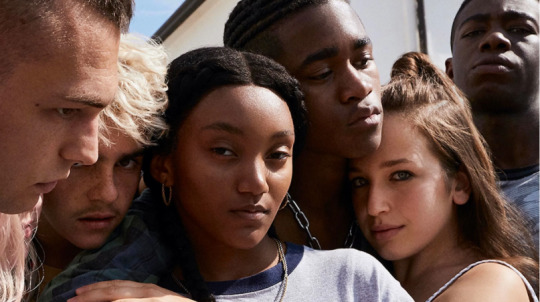
#We Are Who We Are#wawwa#wawwa spoilers#wawwa hbo#jack dylan grazer#jordan seamon#luca guadagnino#series review#I lived for the fact that Fraiser is an absolute mess cuz same#chloe sevigny#faith alabi#tom mercier#jonathan wawwa#hbo max#coming of age#kid cudi#spence moore ii#corey knight#francesca scorsese#alice braga#i can do a in-depth character analysis cuz i feel like there is a lot to every character that most people haven't addressed#really enjoyed it#if it doesn't get renewed im gonna fucking cry#fraser wilson#caitlin poythress#sarah wilson
44 notes
·
View notes
Text
I don't know what you think about labels, maybe you are the kind of person who watches shows like Marie Kondo where they organise people's houses and put sticky labels on everything so that you can easily identify the contents. Maybe you're the kind of person who does not like to be labelled or stereotyped. Maybe you prefer to be just yourself.
I have had a very complex relationship with labels and identity. You could say that I started off on the wrong foot. My mother went to a Baptist church on Sunday morning and a Charismatic/Pentecostal hands-in-the-air, shouting and screaming, spiritual warfare kind of church on Sunday night. And my dad had his Holy Communion as a kid and then went to mass on Easter and Christmas. So to begin with my labels were numerous and incongruent which did cause some issues for younger Zoe.
And I want to share with you about where God has led me through the understanding of this topic. I am not entirely sure where to start and I'm not sure how vague to be here but let's just say that at least the draft will be an explicit and partly chronological one.
12 year old Zoe I went to church most Sundays with her family and she was very very lucky to have a wonderful Christian friends in her life and at this point the label attached to her as a daughter was the unproblematic child and at school she was the sweet and friendly member of the God Squad or Singing Christians depending on how you asked. But those were the kind of labels that existed around that time.
What happens though to 12 year old Zoe is that she falls madly and instantaneously in love with her best friend. And almost immediately she thinks ‘am I in love with this girl? that must make me gay.’ And being a part of the circles that I was in a fairly conservative Christian family and a fairly conservative Christian School with Christian friends in that Christian school, I said ‘absolutely not. I don't want to have to deal with that.’ I was never hateful towards gay people in general I just thought I just didn't want to deal with it myself. My mum and I had had conversations about it when the plebiscite happened, and whenever we spoke about it, it was very much about ‘the gay people’ as opposed to anyone we knew or loved, let alone a Christian person, and so this whole gay thing wasn’t really thought about. Ao a few times over the next 2 or 3 years so I would ask, ‘am I in love with this girl’ And I always concluded ‘no no no you can't be in love cos you're not gay’.
By the time I’m about 14, I’ve been awoken to all different kinds of social justice movements, I took sociology, I’m going to save the world. THe labels I proudly wear are things like left wing, passionate, an ally to many different communities, in particular the lgbtq+ community.
Zoe at one point goes ‘frick frack, I'm definitely in love with this girl’. and because of the way that this world really loves labels, this was completely synonymous in my mind with being gay. My first response was probably because I'm bisexual so now that is an importand confusing label Zoë is wearing. I have somewhat fond somewhat mortifying memories of sitting on the Shinkansen, the bullet train, from Tokyo to Kyoto next to my dad doing every single ‘Am I gay’ quiz I could find online. Throughout this trip to Japan, I’m really testing the waters and every single younger woman I saw I was like ‘Is she cute? Am I attracted to her? Would I kiss her?’ and so that experience made me very nervous because I had still grown up with the mindset that if people were gay it was ok but they weren't Christian. And I was a Christian, so I just ignored it really. And this turned into a time of me hypersexualising sll of the boys that I had ever thought I had a crush on. I can quite confidently say that I didn't actually have a crush on many of them, I just thought that that was something that I should do. So there was a lot of ignoring this feeling.
We then reach year 10, 2020, a glorious year. In the first Lockdown, I finally caved and downloaded Tik Tok. The thing about Tik Tok is that it comes with its own world of labels, and I really would enjoy the kinds of conversations about what side of Tik Tok you are on. I loved that your For You Page automatically gave you certain labels to wear as a Tik Tok user, and I loved that those applied to real life. I quite quickly ended up on gay Tik Tok, among other things. I was also very firmly on Black Lives Matter Tik Tok, on disablrf Tik Tok, on Indigenous Tik Tok, so on and so forth. But much of my content was about the lgbtq community and this opened a ahole can of worms. I, at this time, carried a lot of shame for my attraction to women. For a bit of a backstory, I had been so severely heartbroken by this girl - not by her own intentional actions, I think that she was never going to feel about me the way that I felt about her and that was not her fault - but I was so seriously heartbroken that not only did I hold this moral shame but also this like emotional shame of my attraction to women. I felt like it was not a good thing morally and it didn't feel good emotionally because I had to still been really hurt about this girl and I have never really gotten over that. So for the first time on gay Tik Tok, I saw queerness and same-sex attraction as a positive thing not only in terms of ‘hey look these are women loving woman relationships that are working well’ but also ‘whether or not you're dating someone, queer identity is good for you and it's fun to talk about’. And as a type 4 on the enneagram, I love to feel special - not to say that I fabricated these feelings or that any queer person is queer for attention - but I think a big part of me felt validated or special because of my feelings and my queeness. It was like a new club that I could join. And so the labels that 15 year old Zoe wears largely consisted of queer. We had it dropped bisexual a little bit because at this point I was not sure if I like men at all and so we identified as queer or sapphic or bi or lesbian or gay - many of these words along with the left wing, Pro Black-lives-matter, pro-feminism, pro-lgbtq+, anti-colonialist anti-capitalist etc. etc. And I don't want to demonize any of those things - they are not at all negative things, I'm just painting a picture of the different labels that I wore.
Through out starting to come out to my friends and existing for longer periods of time not only on gay Tik Tok but now really searching all through the Internet for more LGBTQ+ identity - as I tried to confirm my traction for women, as I tried to decide about my attraction to men, about what label I should wear, and what it's like being in the LGBTQ+ community different, spaces where we interact, different identities and labels and experiences of queerness. So I really tied myself to this identity and it is I think so much because of the way the world sees labels as I said and so my first response was ‘well if I like girls I must be gay and if I'm gay I must identify that way and that has to be the most important thing about me’ because all the people I was seeing online really loved being gay. They were proud of their identity in their queeness. In the world as much as I think that we like to think we’ve got this ‘your sexuality or your gender identity doesn't matter. Gay and straight and bi and pan and whoever you are, we’re all human’, I think it often the world does like to draw those lines on both sides. Within queer communities there was - obviously ironically and satirically - this heterophobia honestly. (I'm joking!) But there was a real pride in this identity of whichever specific label you wear as well as the wider lgbtq plus label which led me to believe my sexuality was who I was. And that proved really quite awkward because I knew that my church and my family and many of my Christian friends believed that same sex marriage and romance was sinful. Because of the strong connection between my identity and my sexuality, if my sexuality was sinful, that meant that I was inherently and completely sinful and I didn't like that. It wasn't a fun feeling. After all of the years of learning about God’s gift of grace to us, kind of I lost in the crevices of my mind and whenever I thought about God I was met with feelings of shame and fear and dread and resentment sometimes even anger and I grew to be so despairing.
Eventually I tried the various progressive Christianity movements that teach that ‘God doesn't actually say the being gay is a sin, the Bible is pro queerness and don't even worry about it, God made you exactly the way that you are and he loves you the way that you are, go forth and have that lesbian relationship that you so desperately want’. But that never really sat right with me. It brought up other questions of ‘well if the current translation of the Bible says things like marriage is between a man and a woman, God made man and woman, any sex outside of marriage is sinful, or even the parts that say that ‘homosexuality is sinful, or man lying with man in certain translations, is sinful what happened to that part of the Bible?’ And of course I heard the response about how at the Bible was written by man and not by God and that it is fragile and can be manipulated and basically King James ruined the whole Bible when he wrote that translation and you don't have to listen to it. But that really didn't work for me. If that part of the Bible had been mistranslated how could I know that the rest of the Bible hadn't been mistranslated? If words like homosexuality weren't in the original text and they had been added there or mistranslated how could I understand the words like grace and love and hope and patience and kindness and peace and righteousness and holiness and justice? What if they were mistranslated? What if the whole Gospel was not how it was written in the Bible because the Bible was man-made? Pretty immediatelyI decided I couldn’t really understand a Christianity where homosexuality is not a sin because Christianity is written in the Bible and the Bible says that quite clearly. I believe that the Bible is directly the Word of God, that it is perfect, that the way that it is translated - obviously different translations vary - but that it is right from God’s mouth so imediately was like I can't believe in it Christianity where homosexuality is not a sin and so I've got to pick Christian or Gay.
And I didn’t want to choose Christian because I had this point has grown quite fond of being gay and I mean, I was truly just attracted to women, right, like I wanted a girlfriend and so I tried really hard to ignore God. I was still going to church, twice or three times a week and all that, and I could not shake the existence of God. I knew God existed. I knew that He created the world, that He was good and that they was the thing called sin that separated us from him. I knew that sin led to death. I knew that He had sent His Son to bridge the gap between himself and sinners. I knew that Son was Jesus and that He died on the cross and he rose again and I knew that if you believed in him you would spend eternity with God which was a really good thing. I could not shake those feelings, all those beliefs, and I absolutely praise God for that. I'm so beyond grateful that God did not leave me, even when I hated him and resented him and felt so much anger towards him. Praise Jesus!
All this left me thinking, well some people could go to heaven, but God hates me because of my feelings. He does not want me part of His kingdom if I'm gay. I can't ever go to heaven because I'm a sinner, and sinners don’t go to heaven. I truly don't know where all my years of learning about the grace of God had gone. This led me to a really distressed position, probably one of the lowest ever my mental health had been. I was just not coping and I ended up being kind of forced to tell my mum. I don't really want to say too much on this part of the story but by the middle-ish end of year 10 I ended up coming out to my mum and she told my dad, ‘cause I refused to do it myself, and then I got a therapist. Finally, now that my mum knew, I could ask her what I had so desperately wante to ask her - if she could please buy me some books about being gay and Christian. And so she did. And I slowly but surely started to read them, I started to read my Bible more and I started to really search for what it meant to have faith trust in God’s grace and not in your own work, not in your own actions or thoughts or words. The first book I got in particular was really hard to read it was based more on specific Theology and not on personal experience and I needed that foundation in what God really said because I had just had conversations with my mum and she had reminded me ‘God is real and he loves you and he sent his son to die for you and that is an option for you as much as it is for anyone else, your queerness does not separate you from Christ's death and resurrection’. There is a wonderful bible verse that became very important to me at this time. Romans 8, the very end of the chapter, says ‘for I'm convinced that neither death not life neither Angels not Demons need of a present or the future and or any Powers neither height nor depth nor anything else in All Creation will be able to separate us from the love of God that is in Christ Jesus our lord.’ So with this in mind, I decided that I could trust God and now I just needed to learn how. so I worked away through different books, through different parts of the Bible, praying really hard, searching online and asking really hard questions to some really awesome Christian women in my life, and asking God to reveal to me exactly what he thought about me and about queerness and so eventually we get to the present moment. I by no means know everything that I wish I knew, but now I can say that I wholly trust God with my next life - I trust that he has the power and the strength and the holiness to overcome even my sin which sometimes feels like the biggest there is. and I trust him with this life - that life with him is so much better than any lesbian affair I could ever experience.
I want to personally apologize to any one who the church or the world has ever made believe that they are somehow exempt from God’s love because of who they are or what they've done or how they’ve felt. That is false. There is no one that does not sin, no one that is not inherently separated from God. And there is no one who is too far from Jesus' power to be saved from that sin. God is bigger than your sin, I promise you.
I want to take this time to mourn for the lives lost and the joy and peace forfeited because of the way people who claim to know God treat queer people. I'm sorry if you have been made to feel less than because of the church. In the process of overcoming of guilt and shame that I have felt over the year, one more verse that I found really important. 1 John 1 says that ‘If we confess our sins, he is faithful and just and will forgive us our sins and purify us from all unrighteousness. If we claim we have not sinned, we make him out to be a liar and his word has no place in our lives.’
So for me, I don't identify with my sexuality. I don't want to say that I'm straight now, that's not really true. but my sexuality is not what makes me who I am. I am a person fearfully and wonderfully made by God and I am a daughter of God in Christ. I am not ashamed of my feelings. I do think that it is worth mentioning that an attraction or a desire or an impulse is not the same as a sin. The Bible tells us that Jesus himself was tempted in every way and the Bible also tells us that Jesus is blameless and never sinned. And so I think it's worth the clarification that same-sex attraction or anything like that is not sinful itself and also that being gay is never worse than anyone else's sin, and it is never ever bigger than God.
I just want you all to know that there is nothing that you have done that makes you exempt from God’s love for you, to know that he is trustworthy, that the Bible is trustworthy, and I encourage you that your value is inherent as a person made in God’s image and that with Jesus, you can have identity in his son alone. When he sees you, he sees the goodness and perfection of Jesus if you believe in him.
5 notes
·
View notes
Note
1. Why exactly do you think that so many non-lesbians (bisexuals, non-goldstars, trans-identified men--whatever) are so hellbent on trying to call themselves lesbians? What's the appeal? I've tried to figure it out myself and every explanation I come up with falls short somehow. I guess they all have different reasons - obviously it's a fetish thing with the straight men - but it's hard for me to wrap my mind around it all. Why do they want to be us so badly while simultaneously hating
2. us (real lesbians)? What benefits do they get from (falsely) calling themselves lesbians? Whatever "benefits" or "cred" they're getting is coming from a very niche place because it's not like wider society gives a fuck about lesbians. Why are non-goldstars so afraid of calling themselves bi? Sorry to throw a million question marks at you lol. I'm just kind of thinking out loud and am curious if you have any theories! Thanks!
it’s baffling to me too. i do have some theories, but there’s so much... deliberate self-delusion and lying that i would never do and even with the theories it’s hard to believe that people would actually go through so much effort and double think to lie about their sexualities.
i think some people want to be a victim and that the validation comes from wider society hating gay people and not from a more niche source like... actual gay people. they want something to blame their suffering/bad mental health/bad behavior (not that they’d ever admit there are toddlers that behave better than them) on and being the abused underdog gives them a superiority complex. identity politics have really encouraged this mentality that Only race, sexuality, gender, etc give ‘valid’ suffering, so people with tendencies towards disordered behavior (not to sound like an armchair psychologist lol) latch onto them so that their words are automatically given more power in certain spaces. and people telling them that they literally aren’t gay only adds to their victim mentality and self-righteousness.
this bleeds into the whole subculture that’s been made around being gay and how iced coffee, being bad at math, being stupid, not being able to drive, etc is gay. people will act shocked when someone who has a certain tumblr/twitter-esque personality and interests isn’t gay or bi, even though they have literally nothing to do with your sexuality. a lot of queer people are honestly just incels/social rejects and will play up their same sex attraction to find like-minded people online or in their college’s lgbt organization. because if you’re really into, like, dnd, it, steven universe, and moomin..... where else are you gonna find people with those interests? it’s a self-perpetuating cycle of people calling themselves queer to fit into the culture, which means other people have to call themselves queer to fit into the culture.
a lot of people also view lesbianism as a phase--whether or not they consciously believe it or not--and when they decide not to pursue men anymore they’ll call themselves gay to prove to themselves how serious they are about their deliberate disinterest in men--see, i’m even a lesbian!--rather than as a label that describes the state of never having been interested in men. i guess just saying ‘i’m bi but just got out of a bad m/f relationship and only want to date women’ doesn’t sound as finite or like as big of a fuck you to your ex boyfriend. the word lesbian is aspirational for the many bi women who’ve built a culture around hating that they’re attracted to men and for the ngs who say that they hated every sexual interaction they’ve had with men, that they were repulsed by the men they had sex with, etc. calling themselves lesbians gives them a definite out from ever needing to have sex with a man again and comphet helps remove any choice from their actions.
i’ve seen bi people say that the open-endedness of being bi is stressful because you don’t know the sex of your future spouse and that will Greatly impact your future, so calling yourself a lesbian when you’re in a women-only mood probably helps make it seem less daunting (funny, though, how they never call themselves straight for the sake of simplicity).
it’s obviously a fetish thing for men, but i think it is for a fair number of women too. they enjoy turning men on by talking about their sex escapades and they enjoy they thrill of a forbidden affair between a ‘lesbian’ and a man.
for some people i think it’s just ignorance. the majority of ‘lesbians’ have pasts with men and there are a lot of strange takes on lesbianism saying that lesbians can be attracted to women and trans women, that lesbians can be attracted to feminine men, that you can be a lesbian if you don’t feel like dating men anymore, that you can be a lesbian if you see men as good for sex but not for relationships, etc. people may have never been exposed to the idea that homosexuals consistently act like homosexuals and won’t fuck the opposite sex under any circumstances. and when the majority of gay people are bi, it’s easy to see anyone who insists that... gay people are gay and act like gay people...... as having some irrelevant fringe opinion.
it’s probably a combination of those things for most people, and i think it’s almost always about some internal benefit and not a societal benefit, because calling yourself a lesbian obviously doesn’t get you anything on a wider scale. they need to be a victim, they need to prove to themselves that they’ll never be with a man again, they need approval, and calling themselves lesbians helps them get that. but it doesn’t completely get them to where they want to be, because lying about your sexuality is obviously just a bandaid on whatever you’re actually dealing with and because Actual Lesbians exist. our very existence invalidates them and proves that they’re faking. so they try to rewrite what it means to be a lesbian in such a way that they fit in and they despise actual lesbians for effortlessly being what they want, or just because they’re genuinely just homophobic under all the identity soup--they’ll call themselves lesbians, use their status as lesbians to declare that lesbians like dick, all while being a regular homophobe who thinks that exclusive same-sex attraction is disgusting.
46 notes
·
View notes
Text
Thoughts.
So I finally watched Good Omens. First of all I know some people were waiting for me to like, do breakdowns on the use of lore, sigils and whatnot -- I’m sure I’ll poke at it eventually, but so much of it reads of typicality, alongside strong artistic liberty, that when it comes to actual sigils there’s very few and I’ll need a good screen of them.
But that isn’t about that. This is actually about Good Omens and the audience response to queer content and queer coded content. I’m going to warn you, some of this shit is going to incense the fuck out of woke tumblr. It’s going to be a lot of hard pills to swallow, mostly in regards to parts of the LGBT community -- of which I’m a part -- moving around our own goal posts, inconsistencies in the placements of our goalposts, and the impacts of het culture. If you come into my mentions screaming away at me expect an ignore or a block.
No, this isn’t anti-Azri/Crow. It’s very pro Azri/Crow. And yes, I’m going to drag other fandoms I’m in, into it. But I’m also gonna drag general discussion into it.
First I’m going to source a link to a recent set of tweets someone made that I consider very insightful (x) and then highlight a bulk of it.
“When we call something queerbaiting, we're essentially saying: "source material X doesn't count as real or valid queer representation." Here is a thread on why we need to be cognizant about which real-life queer people & stories we're erasing when we expand our use of that term.
First: actual queerbaiting, in which art-creators hint at queer representation in order to attract viewers and then insist their art was 100% hetero all along, sucks a lot. I am not advocating getting rid of the term.
Nor am I saying it's not valid to feel jerked around when a show uses the promise of a specific queer relationship on their publicity circuit, and then doesn't follow through on it in the actual source. (Or follows through only to write out a character, a la #TheMagicians)
However: when we narrow our definition of "real and valid queer representation" until the ONLY thing that counts as queer rep is on-screen queer *romance* or on-screen queer *sex*, we are telling a significant portion of the real-life queer community that they don't count.
When we use the "queerbaiting" label to describe a millennia-long, loving asexual same-gender relationship (aka #GoodOmens) we are telling asexuals in loving life-long relationships that they don't count as queer.
We are also telling sexual queers whose primary, life-organizing relationships are queerplatonic (me, this is me) that their queerness is defined only by who they fuck, not by who they choose to build a life with.
I want a space where ALL kinds of queer stories get told: romances yes, but also stories of queer friendship; queer mentorship; queer animosity; queer competition and cooperation; queer found family; queer provocation and queer mistakes.
None of that happens if we tell everyone whose queer content doesn't fit into the narrow box "Lead A & Lead B kiss and/or fuck onscreen" (even if A&B make a life together; even if A&B kiss & fuck other same-sex people) that their art is exploitative & doesn't count as queer rep. “
Why am I choosing to highlight this while implicatively mentioning my adjacent fandoms? Well, because blogs I follow that either haphazardly dismiss, say, Destiel as valid until (personally met goalpost, generally when arguing with the hetnorm or anti community wanting a kiss) are all on the Azriphale-Crowley bandwagon.
And let me say, I adore the Azriphale-Crowley bandwagon. I’m ON that bandwagon. Holy shit am I on that wagon, but we need to inspect our dialogue for people who are on one but not the other.
We can say, for example, “Well, Neil Gaiman and the actors have been supportive! So THAT’S why it’s fine!” I mean -- aren’t people always banging on about post-affirmation not being enough, or just vague support being enough, or this-or-that not being enough? Like people don’t flame Rowling over that? I mean, even if we handwave away that Neil Gaiman had literally uncontested authorship instead of 203492 hands in the author and ownership pot top-to-bottom which the average show doesn’t have -- which gives the liberty to say whatever the fuck he wants because it is wholly his product and under his contract and design -- do you notice that it’s actually a very, very small audience crowing about that? And rarely if ever the same ones that do about other pairings that could be considered similar? Like we haven’t gotten those moments from authors in other shows (Robbie Thompson “Destiel isn’t canon?” comes to mind) that we yell queerbait at then and decide isn’t enough. Because someone else moved a goalpost out.
Ah-- but they’re... confirmed asexual and agender and immortal! Okay... and... so is, for example, if we’re going to tilt this way, Castiel. And ace people can have queer relationships with bi or yes, even straight people. Mindblowing, I know, but that’s it, that’s reality.
So why on gods green earth am I seeing this disparity between blogs about the same content, banging on at different volumes of what we expect?
It’s something I’ve written about before, the loudest example being my Problem With DreamHunter post. Before any DreamHunter fans pick up the pitchforks, don’t worry. It, also, is in support of DreamHunter, but simply addresses the cultural problem in there not being a problem with DreamHunter. The blend of intersectional issue disparity between MLM and WLW, and also the simple fact that the fandom wasn’t positioned to have antis or rival ships screaming at it: het culture and shipping culture.
I’ve banged on about this before: in our race for representation, we often trample over content that’s perfectly good and valid and great in many ways, because we want to be able to win an argument against an asshole, we want to be able to bludgeon the gay so inarguably into somebody’s brain that they yield to the might of it, or at least, we imagine it reaches that point. Anti-shipping culture can be so loud that even slow burn het pairings that kiss will have antis explaining their way around it (eg, Mulder and Scully, off the top of my head). Anti queer culture will talk down men or women even making out on screen as experimentation. This cycle will continue.
So again, let me state: Good Omens is a masterpiece. I am utterly enthralled by it, but it does leave me sitting flummoxed about the uneven bars we put out there as marker posts based on trying to race to the finish of arguments.
I’m sure some hack job that doesn’t know how to rub brain cells together beyond “it’s straight” and, beneath the surface, “I don’t like it so I’m going to piss and moan about more expansive methods of thought than hard niching the complexity of human relations” is going to roll in here, thinking yelling “Jensen Ackles thinks it’s straight!” in supreme reductionism of things like authorship, be it intent OR death of the author, or whatever else is out there in this medium -- I’m sure they’ll show up, make the same repetitive ass of themselves as always, and roll on, completely missing the point that I’m not obligated to your arbitrary bullshit, and that nobody is.
I don’t HAVE to point out every single time a dickhat on a loop yells that, that Jensen Ackles himself spoke of the intangibility of the deepness of their connection with Castiel as an angel, and that a cishet dude from texas probably doesn’t understand the finest details of LGBT identity complexity despite being an ally while fumbling over talking about the difficulty of putting a label on it. I don’t have to explain that the actor doesn’t actually get to determine that. Viewership or author, take your pick. I don’t have to explain the “it’s never happening and wasn’t intended” never came from the authors every time some bumblefuck says it -- that it came from one account with a blurb that said he doesn’t speak for that writing room whatsoever. I don’t have to review the times that Jensen Ackles has almost verbatim mirrored the Good Omens creatives about the beauty of it being you being able to make your own interpretation even if it wasn’t his, and encouraging that. I don’t fucking have to, you entitled sniveling shits.
And no, it’s by no means about, say, Dean and Cas. It’s just about the dialogues I’m tired of seeing tilt unevenly even between typically well grounded and centered people.
So anyway Azriphale and Crowley are EternityMates and that’s the fucking tea. Call it queerplat or call it queerromantic I can see either, even if I do tilt towards the former.
Destiel is queerromantic and you can fight me.
Come at me. Except nobody really will over Good Omens, just Supernatural, because like magic, Good Omens isn’t geared for a fuckton of other bloated ships or antis who hate either of them by structure alone. And that, itself, is a point to be made, too.
And before some doodlefuck trolls along, no, there’s no such thing as incestromantic. Spare us the time and block me now if your knee jerk counter-troll is going to be subtextually along those lines, because I promise you’ll just get blocked when you try to roll into town with it. Since the Supernatural fandom seems to house corners of douchebags that don’t know how to control their primitive douchebag impulses and they do come into address in this post.
Moral of the story: Stop listening to homophobes, antis, or people with agendas. Listen to the content and what has actually been said. On all sides.
If you consider, for example,
the Ineffible Husbands canon with no admission of anything beyond friendship, with the hets loudly banging one scene over with “well the others are ace or whatever” as your reason (fair), a few lunches, basic dedication and a few well placed songs, and a few supportive notes from the general creatives,
But the Hunter Husbands not canon with talked-around love yous and need yous, intentional deletion of Castiel’s agender ace aspects, in spite of there being no evident banging or kissing in the show that hasn’t been a highlight of a problem since like season what six?; talk arounds of their meals together, infinite longer and classic romantic crafted dedication, innumerable well placed songs and yes, a few supportive notes from the creatives that are buried by yourself or others beneath intentionally obfuscated arguments and spun context,
You are, whether you want to gullet it or not, part of the moving goalpost problem. Whether it’s you running to meet a phobe or an anti, or just being coded into it by the screaming around you, there is no world in which one is representation and the other is not. It’s just fuckin’ not.
It’s not.
I don’t care what you yell and scream because it’s popular in your circles. It’s fuckin’ not.
It’s not.
Either both are rep or neither are rep. Personally, I adore both of them, and anyone that has a problem with that can eat me.
Good Omens is not a goddamn motherfucking breakthrough in representation. It’s the same very valid very real form of queer coding half this site screams at because someone got loud enough to scream about it early on, generally inspired by antis riding their ass, just it’s the first and second lead instead of second and third lead, and there’s no ‘rival’ in first and second leads as being intentionally dragged into vaguery. It’s. Fucking. Not. It’s literally. The same. Fucking. Level.
Now, I HAVE been banging on that it’s the level our content SHOULD be acceptable at (well, almost; frankly I’d consider Destiel better, as the show’s overall intimacy threshold is far lower while Good Omens has parallel overtness to the coupling in the actual canon, meaning Good Omens’ playing field, for fair treatment, would be indebted to matching volume -- not saying sex since ace but louder admissions and engagements that are just as clear.)
Unpopular? Good, I don’t care. I’m tired of people screaming about completely conflicting crap.
It’s where we SHOULD be taking ownership of our content. So if there’s any breakthrough, it’s the LGBT community themselves having some sort of spark of awareness that they can and should be able to own content at that volume, largely because the fandom isn’t swamped by asshats on the other side all yelling for their own crappy agendas clogging up your heads. There’s a few queerbait shouters. And you laugh them off, by and large, and accept it as canon and rep. Funny how that works without antis up your ass.
Sincerely,
A tired queer and newborn Crowley stan.
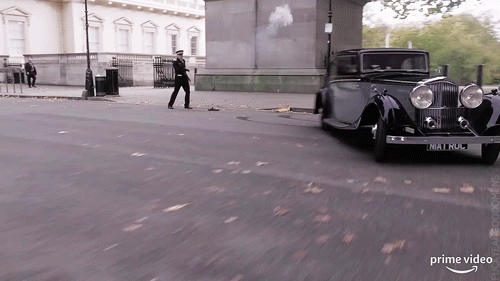
46 notes
·
View notes
Text
why aces belong in the lgbt+ community a Not comprehensive post tm
god I hate this discourse so much. it’s not a fun rousing kind of pissed off like arguing about star wars or w/e. I feel ill having to say this and I feel ill thinking people will want to inject their own ideologies into what I’m about to say, about my personal experience of identity
look. I’m neither cisgender nor heterosexual. I’ve had pre-puberty anticipatory body dysphoria, I’ve had tons of gender presentation dysphoria, I’ve had gender euphoria from people telling me they don’t see me as a woman. I felt isolated in a lot of ways when I was younger simply because I didn’t know how to engage with people in their gendered world I didn’t connect with. and obviously I’m not heterosexual because I’m ace but I’ve had strong aesthetic attractions to women and also found that I’m probably somewhat demisexual and I don’t want to get into that too much more (personal) but basically to the extent that I can be romantic or sexual it is not in a straight way.
on these grounds I would hope I would belong in the lgbt+ community
but the thing is -- neither my gender nor my multiple-gender-interest expressed themselves until I’d come to terms with how my aroasexuality shaped them both. because that always came first, and it was always really vivid in my mind. it was so vivid that I invented the word asexual to describe it quite independently of anyone else when I was a pre-teen. asexuality was always what made me different, what made me feel like I was not part of cishet society. I felt like I wasn’t fully a woman for many reasons, but I especially knew that I didn’t want to be a gender that people could be attracted to! that I wasn’t a gender that people could or should be attracted to, in the way that people can be attracted to men or women (because I had only learned the binary at that time). and so, also, my feelings towards other people were not governed by the interplay of recognizing people’s genders and sensing your own sexuality that allo people experience.
asexuality is a huge range of experiences but a lot of those experiences are highly unique. and not in a ~fun~ way. maturing into asexuality can mean not knowing if every interaction or social connection you’ve had is sexual. again, I don’t want to get into certain things (you don’t have a right to all my personal anecdotes ok?), but it can mean feeling like any strong attachment you hold to something is sexual or romantic, and before I identified as ace, when I was around 8-9, I ended up doing a few things that I really regret because I couldn’t distinguish that emotional difference (they’re not that bad, just kinda odd neurodivergent child behaviors, don’t worry about me, but I still have these memories uneasily rattling around my brain)
what I’m getting at is that asexuality is an extremely queer experience and if you’re allo then it’s not your queer experience and you can’t measure it by your own standards, and it shouldn’t be offensive to suggest that. and it can’t be separated into its own community. I am not cisgender -- but my gender comes out of my asexuality and so if the queer community wants my queer gender, it will have to take my asexuality with it. I am not hetero-attracted -- but my non-het experience comes out of my asexuality. if I end up in a relationship with a girl, even one with sex as an element, it would still be an asexual same-gender relationship and my desire to be with them would be an asexual desire.
the ace community cannot be separate from the lgbt+ community. I cannot separately be lgbt+ and ace. my gender identity and non-het attractions clearly belong in lgbt+ spaces. but they are asexual. what do you expect me to do in your lgbt+ space, to express my gender and attraction, without my asexuality? you can’t pull these two things apart.
so as a non-cis non-het ace, you are literally expelling my queerness from your community by making asexuality some separate thing.
the question of whether asexuals are oppressed or not is honestly BS because a) I can’t speak for the many asexuals who have in fact been stigmatized for their identity but they can damn well speak for themselves and they do but people refuse to listen and b) we’re trying to make a world where no one’s going to be oppressed. even in a world where no queer people are stigmatized or mistreated, there are still going to be experiences that are queer because they’re different. and asexuality is always going to feel different because of how formative sexuality is to individuals and society! we’re always going to be something else. why doesn’t that belong under the lgbt+ umbrella?
saying you don’t thing aces should be in the community focused on marginalized genders and sexualities that you’re in, but some other community, basically means you think you shouldn’t have to hear any of the complex ideas about gender and sexuality that we could offer. you think you deserve the right to to avoid our voices in broad conversations about these topics
allo folks? can I have your attention please?
stop acting like you can personally comprehend the experience of being aspec and freely categorize it. and if you’re angry that we’re talking about how not wanting sex is valid (but also a complex and multifaceted way of being), because your identity has been stigmatized as hypersexual, I just have to say, is making asexuality a queer thing going to make all the other sexualities more sexual? like if you’re in proximity to us and consider yourself in a community with us, that suddenly makes your sexuality look too sexual to the cishets?
do you think that we’re going to be treated as the good queers? is that it? I do genuinely empathize and understand this but it’s also a fucking petty and frankly selfish fear. you don’t get to kick us out because you’re afraid of what other people will think and do simply because we exist. and it also plays into the bullshit about how Oppressors(TM) and Oppressed(TM) are always clearly delineated along an axis of oppression -- allosexual people face tons of problems due to compulsory allosexuality in society! one of the longstanding problems throughout human history is people delineating the right way to be allosexual. people making the experience of having sexual attraction (not necessarily having sex) the locus of judgement on a person’s character because it’s seen as this universal part of being human, some unifying thing that all human psyches can be judged on, which lets societies justify extremely harsh judgments. looking at you, Religions Of That Book That Classifies Sexual Desire As Defining Humanity And Humanity’s Original Sin Establishing Their Capacity For Good And Evil (or just the adherents of those religions that use that interpretation, which is and always has been a lot of people)
anyway where the fuck do you get off citing how people stigmatize the lgbt+ community as hypersexual when you believe that sexuality should be mandatory for participation in the lgbt+ community but optional if you’re going to go anything else
#also if you come trying to start shit with me I'll tie all your shoelaces together#don't even think about it
3 notes
·
View notes
Text
happy ace awareness week
i think you’re all probably aware that i’m ace by now, i mention it from time to time, but in case you’re not... heyyyyyy
you can find a lot of ace resources around, teaching you about asexuality, what it means, etc. i’ve been personally appreciating the hell out of lyd’s comics on the subject, the most recent of which is here.
this post isn’t for that. this post is for being aware of where i’m at regarding being ace. i would appreciate it if you read it.
hashtag lgbt/ace discourse ahead.
it’s been a weird year for me. a lot of good things have happened, and so have a lot of bad things. dealing with my asexuality has fallen into both categories.
when i first encountered the term asexuality and adopted it for myself it was a very different time. i had made a friend who was ace. without going into detail, they were a little older than me, and were dealing with the aftereffects of a bad relationship where they felt harrassed and later assaulted by a partner. so i came into it with the full awareness that being ace could be rough and cause discrimination, etc.
but honestly, in some ways, it was an easier time. back in 2011 asexuality felt less visible, but where it was visible, it was accepted pretty freely. some conversations around terms like “allosexual” began cropping up around them. i think i navigated them fairly well, and i learned a lot, and with everything i learned i grew surer that being ace was both a term that made me feel validated and comfortable, and the word that best defined my gender/sexuality experience.
the worst thing i had to deal with was people who hated “aces prefer cake” jokes and the occasional “stop calling yourselves aces you’re not playing cards” which, meh, it’s just a cute shortening. i love it. didn’t stop then, won’t stop now. you couldn’t pay me to go back to a time when i thought sherlock was worth any attention (i at least didn’t fuckin ascribe to a lot of the shit like “oh he’s ace/aro and it excuses his bullshit” haha fuck off.). but. boy. sometimes i miss it.
this past year or two, it’s been shitty. first we had the tail end of the “queer” discourse. i understood some viewpoints coming out of that, but ultimately settled on feeling like it the people arguing to remove it from the lexicon were wrong. i think there’s some valid points to be made, but mostly found the whole argument tiresome. Let people call themselves what they want, and don’t use it for people you don’t know like it, or for the whole community. Done.
and if I’m a little more hesitant to use it for myself, if i once described myself as queer freely and happily, and now do so nervously, backspacing it out of the text once or twice, that’s... something i hope to overcome.
but boy oh boy did that discourse just dovetail right into my personal hell. the kind of people who don’t want to see the community expanded, who want to stay on top and exclude people who aren’t being their kind of gay, immediately dug their claws into that argument about “queer” and didn’t stop.
i’ve endured months and months of ace discourse now and it’s... it’s been exhausting. i’m not even directly involved in it, but it’s still there. it’s constant. it’s insidious.
what started as a counter argument of “queer is a great as a blanket word for people with complex identities, such as ace people” dove directly into “well, are ace people lgbt?” and didn’t stop. suddenly it was the topic of the season. early definitions said “yes” or “if they think they are.” more arguments. “well, heteroromantic aces aren’t lgbt,” became popular. i can see why. that kind of invisible distinction could play well into pretending you’re straight, after all - right? so went the discourse. ugh.
as that argument caught on, people with anti-ace agendas pushed it further. “so being ace alone doesn’t make you lgbt.” “kids can’t identify as ace, that’s sexualization.” “cishet aces just want to steal our resources.”
i don’t want to go into all of these but. boy. some of them were presented logically, kindly. others devolved quickly into “aces are the worst and can die,” “ace people don’t belong full stop,” and even “lol look at me i’m a tumblrina i’m 13 years old asexual fictkin special snowflake” as the punchline of jokes that spread outside of this site.
some ace people are assholes and of course stirred the pot more by being overtly bitter/turning things into oppression olympics type bickering over how aces have the worst, or whatever. some blogs people cited for examples of “terrible ace people co-opting lesbian stuff” or whatever else were literally from sockpuppet blogs making fun of ace people.
for a time, i even bought into some of it. i thought some of the early arguments, that heteroromantic aces shouldn’t be considered lgbt, might have valid points. but you know what? that’s bullshit. if you believe you belong, you should be welcomed with open arms. hetero aces experience some of the same shit i do. they probably also experience other shit. just because i don’t know what it is, or it’s different from mine, doesn’t mean it isn’t an alienating, and perhaps even queer, experience. their sexuality, as nuanced as it is, still sets them apart and they deserve support. we all do.
it sucks to think that this shitty shitty discourse had me believing in a position that invalidated my own experience of aceness being the source of much of my queer experiences, for a while.
all this to say nothing of the invisible hate seeping towards aromantic people as well, lolololol. it’s not a big part of me the way being ace is but i’m probably somewhere on the aro spectrum and. great. thanks. i’m still so tired of split attraction model arguments. if it works for you, use it. if it works for other people, let them use it. is it so hard to believe that some people might experience things differently to you? or differently to how you would imagine? god.
my favorite part is when allo people started saying “allo is a slur!!!” when, get this: allosexual was pushed for and partially created by allo people who (rightly) didn’t want to be called “sexual,” like poc, and rape survivors. ace people adopted it into their language for their benefit, not for ours, lololololol
so. that’s the year i’ve been dealing with. i’ve had to unfollow a number of people i thought were otherwise cool over this. i haven’t gone a single month without finding someone i think is amazing, reading through their blog, and discovering with a sense of nausea that they would hate me. genuinely hate me. there’s no love there. someone who says “u shouldn’t follow me if you think ace people are lgbt lol” isn’t interested in hearing and believing my stories, my experiences, my life which is hard and queer and as deserving of support as anyone’s. they aren’t interested in treating me like a person. that’s... i mean, i think that counts as hate. yeah.
i still hesitate on the word aphobia, or, similarly, biphobia. i don’t know if it’s the right way to describe it, when the hatred you refer to comes from within a similar group of people with oppressed sexualities. i wouldn’t hesitate to say post from an allosexual person in favor of in corrective rape w/r/t ace people are aphobic. i wouldn’t hesitate to say a straight person who thinks bi people are disgusting is a biphobe.
but is that reality talking, or is it just me being unable to acknowledge that oppression is oppression, fear and hate are fear and hate, and discrimination towards aces, which i’ve spent the last two years being told isn’t real, despite experiencing it on a regular basis both in and out of community?
what’s the line between discrimination and oppression? if people’s everyday biases make it harder for ace people to live their lives, is there a point in determining that line?
i fuckin dunno. i’m so tired. i’ve spent a long year feeling like i’ve shrunk myself. i feel more comfortable lately talking about fictional ladies and my attraction to them, which isn’t sexual, and isn’t exactly romantic, but it’s... it’s something that exist. just recently i became comfortable feeling like i can use the term “wlw” for myself, which i fought myself for a long time on. being ace, being quietly non-binary were both things that felt like obstacles.
and the wlw community is just full of toxicity still. terfs have grown and drawn others to their ideologies, some of them using anti-ace tactics to do so, others using tried and true biphobic messaging and of course, who could forget the constant hammering of “trans women aren’t women” bullshit they like to pull.
so that’s one triumph of the year. i’m nb, i’m wlw, i’m ace. i can say those three things and feel pretty comfortable in it.
i just wish it didn’t also come at costs. i find it harder to express my ace life. i find it harder to feel positively about it. i don’t have the energy to deeply deal with ace headcanons lately. it feels like the online world is hyperaware of us now, if anything. everybody has an opinion. moreover, people feel entitled to an opinion, in a way they weren’t before. people feel like it can be their opinion that my ace experiences aren’t lgbt, or that my sexuality doesn’t exist or even harms theirs, or... i don’t know. what will be the next big reason asexuality is terrible/invalid/not lgbt?
if you bothered to read or hell just skimmed this long post... thank you.
thank you.
i know i’ve been quiet about a lot of this. not all the time, but a lot of the time. i feel bad about that, a little? i want people to know what this looks like. knowing asexuality exists is so, so good. but knowing that ace people are facing right now, the movement of hatred that has swept across pockets of lgbt people in recent years, and having the awareness to try and combat it...
it would mean a lot to me, if it felt like more of that could exist.
6 notes
·
View notes
Text
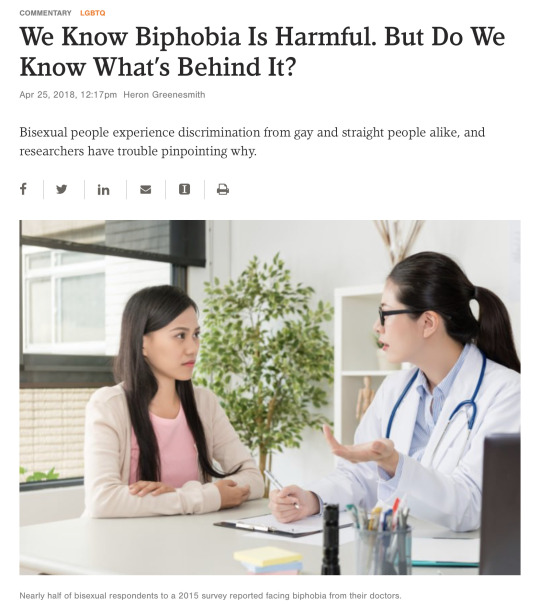
In early April, the LGBTQ publication Queerty ran a piece called “Why does bisexuality still make us so uncomfortable?” in which the author, Jeremy Helligar, describes the moment that a date told him he was bisexual.
“I told him it didn’t matter to me, but I lied,” Helligar writes, explaining that the stereotype of bisexuals having “more options” made him nervous.
Although Helligar says he’s not the type to “side-eye” bisexual people and that he accepts them “in theory,” he is, in reality, reproducing biphobic rhetoric that many bisexuals hear on a nearly daily basis.
Biphobia (the fear and dislike of bisexual people and others who have the potential to be attracted to more than one gender) has been studied for decades. Used by bisexual activists since the 1970s, the term was brought into prominence in 1992 by the researcher Kathleen Bennett, who talked about the “denigration of bisexuality as a valid life choice.” In 2002, Patrick Mulick and Lester Wright developed the “Biphobia Scale,” a set of thirty questions which they used to measure negativity towards bisexual people. Mulick and Wright were the first researchers to confirm that bisexual people experienced “double discrimination”: that is, negative behavior based on their sexual orientation from gay and lesbian people as well as from straight people.
Almost two-thirds of bisexual respondents to one 2015 survey reported hearing biphobic jokes at work. In another survey the same year, nearly half of bisexual respondents reported facing biphobia from their doctors. Biphobia impacts bisexuals’ health and earning power. And biphobia can have more dangerous effects on bisexuals’ lives: Among multiple factors analyzed by Marywood University professor of psychology Susan Turell and her colleagues, “bi-negativity” was the greatest predictor of whether a person was likely to be abusive to their bisexual intimate partner.
In early April, the Daily Beast shared a powerful profile of Dr. Brian Dodge, a researcher on bisexuality and biphobia at Indiana University. Dr. Dodge’s work with the Bisexualities: Indiana Attitudes Scale (BIAS) has revealed the depth and breadth of biphobia expressed by gay, lesbian, and straight people across the United States. In 2016, Dr. Dodge and his team found that while modern attitudes towards gay and lesbian people have undergone a marked positive shift, overall attitudes of gay, lesbian, and straight people toward bisexual people have merely shifted from “very negative to neutral” over the past decade. Attitudes towards bisexual men remained lower than towards bisexual women.
Also in 2016, Dr. Tangela Roberts and others asked more than 700 bisexual people about their experiences of discrimination in various contexts. They found that while bisexual participants reported higher quantities of discrimination from heterosexual people compared to gay and lesbian people, the relative impact of the discrimination was the same from both groups, negatively affecting how the bisexual respondents viewed their own internal bisexual identities.
While these studies shed important light on the extent of biphobia faced by bisexual people, they don’t really examine why biphobia is so prevalent among lesbian, gay, and straight people. In fact, it is very difficult to research causality—there are often many competing and compounding factors that lead to discrimination, and it can be difficult to pinpoint exactly which factors are most indicative.
In March, the Journal of Sex Research published a study that tested participants’ assumptions about hypothetical straight, lesbian, and bisexual women and found that bisexual women were viewed as more confused, promiscuous, and neurotic than straight and lesbian women. Alon Zivony, the author of the study, theorized that “bisexual stereotypes seem to be deduced based on the idea that men and women are opposites: if one holds two opposing attractions, then it stand to reason that this person will be confused.”
Late last year, Nicole Johnson and MaryBeth Grove published a paper looking into possible causes for the intensely high rates of sexual violence that bisexual women face. (Nearly half of all bisexual women have experienced rape and three-quarters of bisexual women have experienced sexual violence, according to the Centers for Disease Control and Prevention.) Johnson and Grove hypothesize that hypersexualization of bisexual women, plus biphobic harassment and bisexual women’s greater likelihood of substance use, may compound to increase the probability of sexual assault.
The authors do not, however, address the complex correlation between sexual violence and substance use and abuse: it is clear that substance use does not cause sexual violence, and in fact substance use and abuse may be indicative of trauma from sexual violence and other traumas associated with biphobia.
Recent research on the attitudes of college students towards bisexual and transgender people found that students who were afraid of ambiguity—who preferred to see things in black and white—were also more likely to express biphobia and transphobia. And queer theory supports this finding: Bisexuality doesn’t immediately answer the question of “who will this person be attracted to,” which may frustrate people used to making assumptions based on sexual orientation.
“People fear what they can’t wrap their heads around and the idea of being capable of being attracted to more than one type of person rejects everything we’ve been taught about how love, sex, attraction, and the human brain work,” Denarii Grace, a singer-songwriter, poet, and activist told me in an interview.
The author of the original Queerty article pinned his own biphobia to his jealousy over his date’s past partners: “I don’t see [bisexuality] as a layover on the way to straight (for women) or gay (for men), as I’ve heard some people describe it. The B in LGBTQ is as legitimate as any of the letters surrounding it. But if I’m being completely honest, a certain green-eyed monster was controlling my innermost thoughts. I hated myself even more for being swayed by the stereotype that bisexual people are sluttier than the rest of us because they have more options.”
In six sentences, the author hit several major stereotypes of bisexuality, common themes in the biphobia that bisexual people hear every day. The author closes with “I don’t know if I’ll ever be as comfortable with B as I am with G, but in this brave new LGBTQ world of sexual fluidity, maybe there’s still hope for me.”
But given the impacts of biphobia on bisexual people, it’s clear that it is we bisexual people who need hope.
UPDATE: This article has been updated to clarify when the term “biphobia” came into use.
#bi tumblr#bisexuality is valid#bisexuality#support bisexuality#bi#bi pride#lgbtq community#lgbtq#lgbtq pride#pride#bisexual nation#bisexual#bisexual education#bi+#bi positivity#bisexual community#bisexual rights#bisexual injustice#bisexuality in the media#bisexual info#bisexual facts#support bisexual people#respect bisexual people#bisexual representation#bi youth#bisexual youth#bisexual pride#biphopia#end biphobia#biphobic
54 notes
·
View notes
Note
I don't want to be disrespectful, but I don't understand your issue with sherlock and "queerbaiting." I'm all for representation in media, however, realistically not everyone is gay. John has said multiple times in the show that he isn't gay, and he was married to a woman. Two men are allowed to be close friends without having to satisfy a tumblr-worthy homoerotic fantasy. As I said, I fully support representation, but just because two characters aren't gay for each other doesn't make a show bad
There are many things I’d like to unpack in your ask, nonny.
It’s difficult to know where to begin. I’ll start by saying I’m glad you agree that queer representation is important. So let’s start there, with the textual representation of queer people in Sherlock.
The characters who are textually queer in Sherlock include:
-Moriarty (confirmed most recently in TFP when he jokes about his bodyguard having ‘more stamina, but is less caring in the afterglow’), -Irene Adler (established as gay during the Battersea scene with John, in which to his assertion that he’s not gay, she replies, “well I am. Look at us both.” More on John later. She also nonconsensually drugs and whips Sherlock, which I think is extremely out of character for a professional in the kink community) -Culverton Smith (who has an honest to god hard on when he’s suffocating Sherlock and breathes his fear of death in and says in the most rapturous voice, “lovely”), -Eurus, (who suggests that the victim of her brutal rape could have been a man or a woman and she wouldn’t have noticed)-and to some extent Magnussen (who creepily kisses Sherlock’s hands, among other weird bodily power things he does, like flicking John’s face).
Perhaps you’ve noticed that this is a list of villains, all of whom are queer coded, and most of whom to some extent have the hots for Sherlock and violate Sherlock’s bodily autonomy when he is otherwise incapacitated (other than Eurus, because equating queerness with incest would be a little much even for this show).
So for our queer representation on this show we get 6, count em, 6 queer monsters, 6 queer psychopaths.
Forgive me if I’m less than thrilled about this.
BUT I was willing to overlook this, I was willing to forgive this, because to my view, the plot was inching forward towards a realistic portrayal of queer love—a nuanced and hard won happy ending, a love narrative that would speak to the complexities of human nature and queer identity.
Let’s turn to that question for a while. Queerness does not exist in a vacuum. It exists within a highly oppressive heteronormative framework. And so when you tell me, John has said many times that he isn’t gay, I say unto you: so did I.
My only way of surviving a homophobic environment was to swallow whole the lie that I was straight, to try as hard as I could to believe I was straight. This is compulsory heterosexuality. The result of this doublethink was that I had no interest in romance or sex. But I publically feigned interest in men for many years. I worked hard to convince myself that I was straight and normative. I was trapped deep in a subconscious closet. We often talk about the closet being something that we know we’re in and we want to be out of it. But I tell you, I honest to god thought I was straight. I thought I would marry a man and have children and live in the suburbs. As it turns out, none of those things have happened, thank god. But I spent many years of my life telling people I wasn’t gay.
By the way re: John and his marriage to a woman, being married to someone of the opposite sex has virtually nothing to do with whether you’re gay or not in a world where visible gayness is met with violence, death threats (my gf has literally been chased with a knife), rape threats (this has happened at least three times that I can think of off the top of my head), judgment, discrimination, and hate. Also, many people, like a younger version of myself once did, believe that they are straight and do their best to act accordingly, including marrying someone and finding out later that they were wrong in doing so. All this being said, John could easily be bi or otherwise queer. Suggesting that his marriage to Mary should preclude any and all attraction to men or taking that as proof of straightness is frankly biphobic and erases the bi experience.
But let’s move away from the personal significancer of a John Watson coming out/discovering himself narrative, and towards addressing your other comments.
Regarding your comment, “Two men are allowed to be close friends without having to satisfy a tumblr-worthy homoerotic fantasy”: From my perspective, summing up what the Johnlock fandom does as “tumblr-worthy homoerotic fantasy” is infantilizing and doesn’t give full credit to the depth of thought and nuance that goes into these transformative works.
I can name on one hand the pieces of mainstream media that tell a story like mine. Blue is the warmest colour is one, Carol is another.
The work these fanfiction authors are doing for representation by taking mainstream stories and queeriung them is monumental. But it is still not mainstream media representation. And we deserve that.
And now we come to the queerbaiting portion of my response.
Tropes are what tell us what kinds of archetypal stories are being invoked in the telling of a new story. In TV, there are many different kinds of tropes: plot tropes, lighting tropes, musical tropes, dialogue tropes, camera angle tropes, etc. For example a long lingering gaze in television codes romance for us. It’s a romantic trope.
For more on tropes, here are some useful resources: http://thorinlock.tumblr.com/post/132779606878/romantic-shots-in-bbc-sherlock
http://ifyouhaveenoughnerve.tumblr.com/post/76422437022/the-unabridged-dictionary-of-johnlock-tropes-157
http://tvtropes.org/
As a culture, we tell a lot of straight white love stories that end happily. Most of our romantic tv tropes come from these stories.
As a culture, we don’t tell many gay stories, and usually when we do, they are tragic and someone dies (http://tvtropes.org/pmwiki/pmwiki.php/Main/BuryYourGays). A common trope in stories about lesbians that I hate is that one woman leaves the other for a man—and that’s supposed to be a happy ending.
The point is, the filming and story telling tropes of romance are all over this show and these characters. Close shots of them gazing into each other’s eyes, the soft looks they give each other when they think the other won’t notice, the soft lighting accompanying these scenes, the dialogue, especially in the scene in ASiP at Angelo’s. As an exercise, try imagining that scene if Sherlock were a gorgeous woman.
JOHN: So you’ve got a boyfriend then?
SHERLOCK: No.
JOHN: Right. Okay. You’re unattached. Like me. Fine. Good.(modified from this transcript )
And then John licks his lips.
This is where it becomes queerbaiting. When the BBC tweets “Sherlock’s in love, but with who?” in order to promote s4, in which Sherlock’s romantic life is not shown to be developing at all, that is queer baiting. And it’s cruel.
More on queerbaiting:
https://www.autostraddle.com/how-do-we-solve-a-problem-like-queerbaiting-on-tvs-not-so-subtle-gay-subtext-182718/
http://www.afterellen.com/tv/471593-lets-end-queerbaiting-2016
Basically, the idea of gayness between Sherlock and John is a running joke on the show, a joke which has no pay off. Perhaps your sexuality has never been thrown in your face, or laughed at. Perhaps you have never been threatened violence or stalked or whistled at. But I have experienced all of this, just for holding my girlfriend’s hand in public.
So in sum, we have a show using romantic film tropes in order to make a joke about my sexuality, a joke at the expense of the marginalized.
Of course I’m upset and angry.
If this is a show about an epic platonic male friendship, that’s fine.
(Epic platonic male friendship is the oldest, most done narrative in existence, by the way. This is an excellent if somewhat dry book about the cultural shift in the twelfth century from tales of epic brotherly love/devotion between knights to tales of chaste courtly love between men and aloof women).
But in that case, stop it with the romantic TV tropes, stop teasing queer fans on twitter, stop making homophobic “no homo” jokes for the straight audience to have a laugh at my expense, and for god’s sake, stop writing all of your villains as queer coded psychopathic monsters. Was that really necessary??? It’s homophobic and it’s bad, lazy writing, and we deserve better representation than that. We deserve more than psychotic gay villains and desperately unspoken hidden subtext and winks and nudges on twitter from the creators. We deserve real representation, no hinting, no winking, no implying. Real, textual queer representation.
My last comment to you, nonny, is this: Indeed, not everyone is gay. And neither is everyone straight. I’m tired of never seeing myself or any part of my identity reflected in mainstream media.
For more information about media’s skewed representation of the world, see this GLAAD report.
#anon#askbox#second ask ever?#queer representation#sherlock#queerbaiting#tv tropes#lgbt#also i don't know how to add a read more thingy#sorry its long
79 notes
·
View notes
Text
J. K. Rowling: Ruined or Revered?
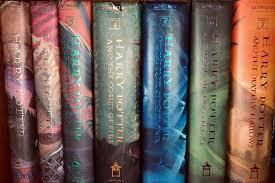
By Cayleigh Pine
When I was in fifth grade, my overly-Christian mother finally allowed me to read the famous Harry Potter series, the same books that millions of children became avid readers of to the dismay of conservative church-goers against witchcraft. I distinctly remember being obsessed with the series, reading one book after another before bed, in restaurants and even during my brother’s basketball games. I became attached to the fictional wizarding world, and I admired author J.K. Rowling’s description of characters that any reader could fall in love with. And readers certainly did, with Harry Potter spanning a blockbuster film franchise, a theme park, a Broadway play, a video game, as well as several controversies regarding its creator. In an age where the fanbase of Harry Potter is stronger than ever, it seems that there are complexities beneath the surface of this fandom, with many furious at Rowling for adding new (and admittingly, strange) details to the Potter-canon, as well as problematic statements posted online. Going from an idolized billionaire authorial goddess to someone almost as hated as her Voldemort antagonist, Potter fans have changed over the years in their support of Rowling and how they view the series due to her many controversies. Due to this, many are conflicted on if they should still be fans of these works, or if they should allow Rowling’s influence to taint the positive message behind Harry Potter. All of this leads into the question: Should readers separate the author from their texts, or is their intent all-encompassing?
Readers tend to become fans of not only their favorite books, but of the authors that write them, leading them into learning about the author’s personal background and writing process. However, others tend to ignore who the author is in favor of not letting them influence how they read a story. “Death of the Author” is a literary concept that was created by Roland Barthes in the essay La mort de l'auteur published in 1967 (Barthes). This theory spawned off of the New Criticism literary movement, delving into the idea that readers should not have the author’s intention influence their understanding of the work being read, acting as though the author is dead or non-existent. Barthes argues that giving a text a single interpretation from the author limits the creativity and imagination the readers can develop off of that work, and how interpretive tyranny only works to the detriment of the reader, forcing an idea on them instead of having the reader come up with their own understanding (Barthes 5). This theorist explains that instead of looking to our authors as god-like and creating something out of nothing, Barthes tries to explain through this concept that there are no original works since writers are influenced by multiple factors, such as: mythology, religion, and other authors. This means there should be multiple interpretations since there are various sources (Barthes 4). In Ancient Greece, playwrights were open to where the sources of their stories came from, re-telling the tales of Achilles and Electra and others and never proclaiming to be original. However, in 1960s society, authors liked to pretend they were the sole, divine creator of their literary universes, and this has continued to the present. The popularity behind the term “Death of the Author” has risen and fallen throughout the years, but the support behind this literary concept has since gained traction with the recent advent of social media. Authors are now posting on their Twitter about character's motivations or secrets that were never expounded upon in their books, leading fans into an uproar against authorial intent.
J.K. Rowling has always been an author in the public eye, her Harry Potter novels launching her into a celebrity icon due to how well-loved they are. With around 500 million copies sold world-wide, she became beloved by many who thought of her as their favorite author (Pottermore). One of the many reasons for this is due to the Barthes-like influence her readers hold in viewing Rowling’s work. Christian groups protested the series after every release, believing that what was in the books promoted Satanism and the occult (Halford 2). Despite Rowling being a Christian (Halford 3), these religious fundamentalists practiced “Death of the Author” to ignore Rowling’s background that is similar to theirs, instead viewing their own interpretation of the Harry Potter series as an unholy promotion of witchcraft for children, which is a very different perspective from what the author intended. However, this also worked in the reverse for readers of the same religion. Many other Christians that are fans of the series used Barthes’ theory to interpret many Christian allegories in the series that they could relate to their own backgrounds, a common example being Harry’s sacrificial death and resurrection in Deathly Hallows mimicking that of Jesus Christ’s in The Bible. Christians seem to find their religion in the stories Rowling created, intentionally or not, and use their interpretations as evidence to the series being in support of or against Christianity.
However, religious groups are not alone in using “Death of the Author” to interpret Rowling’s writing. According to the study: “The Greatest Magic of Harry Potter: Reducing Prejudice” published in the Journal of Applied Social Psychology, psychologist Loris Vezzali asked fifth graders to fill out a questionnaire about their attitudes toward minority groups, then had them read excerpts from the Harry Potter books that dealt with prejudice. Specifically, the blood prejudice that is a major theme in the books about how some “pure-bloods” consider themselves better wizards than “half-bloods” or “muggle-borns” due their different backgrounds. According to readers, this is an allegory for racism, and this theory shines through with how Vezzali’s study proved that young readers living vicariously through the characters in Harry Potter impacted their attitudes positively towards marginalized people in real life (Vezzali). Readers tend to use this as a basis for the series being progressive, interpreting the series to be against racism. Unfortunately, the series is not as cut and dry as this. According to the Midwest Quarterly, author Christine Schott argues that there is racism prevalent in this series, but fans ignore these instances. The house elves in this story are essentially slaves for pureblood wizard families and who “do not want to be freed” even when characters offer to help save them. Schott explains that the creation of creatures that desire to be slaves teaches readers a message that some beings are naturally inferior to others and want to be enslaved, which is a horrible message if these books are supposedly “progressive” (Schott). It seems here that Harry Potter can be, and has been, interpreted in various ways, all due to who the reader is and how they utilize “Death of the Author”.
Besides there being many interpretations of this series, the majority of fans tend to look at the books as an allegory for sticking up for underrepresented groups. It seems that Rowling also gravitated to this positive interpretation, with how she began to make additions to her wizarding world in order to appear inclusive, but they all seemed to backfire. Her controversies began in a 2007 Q&A session at Carnegie Hall with fans of the recently released Deathly Hallows, where she stated Dumbledore was gay (Smith 2). This split the fandom into two groups: supporters who thought this was great representation for the LGBTQ+ community, and those that questioned why Rowling felt the need to reveal this if she never included Dumbledore’s sexuality in the books. The latter’s opinion has intensified over the eight years since this comment, and with Rowling’s new Fantastic Beasts film franchise—prequels including a young Dumbledore—that still do not explore his sexuality, fans are speculating that she has been using Dumbledore as a way to prove she is “progressive” with nothing to show for it, accusing her of the harmful marketing tactic “queer-baiting” in order to attract the queer audience while not offending conservative consumers (Bradley 3). This past comment led into more controversial statements, like her comparing her fictional werewolves to the AIDs epidemic in the US (Baillie 2). This shocked many people because most of the werewolves in her books were framed as villains that preyed on young wizards, so with Rowling’s commentary, this comment becomes a metaphor for gay people preying on children. Because of Rowling, the readers’ interpretation has shifted from viewing werewolves as mythological creatures to now gay predators in disguise. The add-ons do not end there, with Rowling beginning to use her characters to advance her political views, utilizing the titular character Harry Potter to say that he would support the boycott against Israel, so you should, too, as well as to deny describing characters’ races in her books in order to appeal to a more diverse crowd (Donaldson 4). She constantly uses her Twitter to inform fans of her new changes to her fictional universe, yet she disappoints them by not including her supposedly progressive ideals in her works outside of social media. Her race and sexuality-bending has become such a hot topic that it became a meme when a comedic article called, “J. K. Rowling Proves That You, the Reader, Were Gay All Along” was published in 2019 to The Hard Times, poking fun at Rowling’s new revelations about characters’ identities that are never shown in her books (Hernandez). Since then, thousands of social media users made Youtube videos, tweets, and memes, parodying her characters, and even her readers, finding out from her that they had an identity they never knew about. However, even with all of this, Rowling was never seen as a fully negative celebrity, at least until her most recent tweet.
In December of 2019, Rowling posted about supporting a transphobic woman named Maya Forstater in her mission on spreading the message that transwomen steal the jobs of ciswomen, repping the hashtag #IStandwithMaya proudly for all of her 14.5 million followers to see (@jk_rowling). This was met with huge outrage from fans, especially those in the LGBTQ+ community. Readers became upset because they felt if they liked Harry Potter, they were supporting a transphobe, and many began to attribute this series with a negative connotation (Donaldson 5). Her fans were mostly upset with the hypocrisy behind this tweet and how Rowling could disregard a minority group, even though her books supposedly stood up against prejudice. However, others argue that Rowling can say and do anything she wants with her characters and their identities, and even the overall message of her book, due to the fact that she is the creator of the series. Writer Natasha Troyka states that, “Barthes’ argument in The Death of the Author focuses on the impossibility of guessing the author’s intentions. If we can’t read an author’s mind, we shouldn’t fixate on authorial intent when reading a story” (Troyka 4). In the case of Rowling’s use of social media, her fans are almost able to read her mind about her intentions due to her excessive tweets. But even with her explanations, fans are rejecting her new form of Twitter-storytelling, using not only Barthes’ theory to ignore her authorial intent, but a rejection of social media in itself. Due to the fact that Rowling is not writing any more physical Harry Potter books and posting add-ons to her Twitter, fans do not count these changes as “canon”, and Troyka argues that that is largely due to the lack of respect fans hold of Twitter versus a book (Troyka 5). This writer mentions how with every sequel the wizarding world changed, with turning from bad to good (in the case of Snape) or even additions to the lore (The Deathly Hallows being created). Troyka asks: What’s the difference between a sequel and a tweet? Who decides the boundaries of works, if it is extra or canon? If it happens on Twitter, does it make the writing any less “real”? The argument here is that even if fans disapprove of Rowling’s quasi-progressive add-ons to Harry Potter, it is still her writing and she still is the creator, so they should count as part of the series, regardless of what platform they are released on. Despite this, it seems that fans are using Barthes’ theory to not only kill off the author, but also any disliked changes she wants to make to the series.
Even though fans hate Rowling’s new additions, considering them more fanfiction than canon, she has always been supportive of fans using her work to create their own fanfiction, with her spokesperson saying she is, “... flattered people wanted to write their own stories based on her characters” (Waters 1). This is not always the case with many authors, such as author Anne Rice (The Vampire Chronicles) threatening to sue her fans if they write anything involving her characters. And then you have former-Youtuber-turned-author John Green, who not only supports whatever fans want to do with his work, but the concept of “Death of the Author” itself (“Death of the Author.”). Green became a famous author off of social media, gaining a fanbase through informational literary videos that analyze classic novels, and then finally releasing a book of his own. In his book, The Fault in Our Stars, the protagonist Hazel gets to meet her favorite author, and learns he’s a reclusive alcoholic whose personality ruins his works for her. This is a commentary on how much influence an author can have on their works, and how an author can ruin their own books for their fans with their wrongdoings that can taint their art. In 2014, Green tweeted, “Books belong to their readers” (@johngreen), agreeing with Barthes’ theory that fans get to hold the interpretation of the work and ignore the author behind it, which is probably a stance he later regretted when he started suffering backlash from fans about his portrayals of teenage girls (“Death of the Author”). In a Tumblr post, a fan described Green as, “...a creep that panders to teenage girls to amass a cult-like following”, wherein Green responded saying he never sexually assaulted anyone (Jusino 3). It was an odd response considering the post never mentioned him doing this, so fans immediately were suspicious. This uproar faded into nothing, but it left many readers feeling uncomfortable with his writing, and in recent years, many posts online shame Green’s portrayal of teenage girls for being two-dimensional. This has led to many using fanfiction as a way to fix what Green created, having the readers utilize their own interpretations “for good”. This is also seen with Rowling’s fans creating fanfiction that they deem better than Rowling’s books simply because it follows their interpretations instead of hers. From this, it is made apparent that when readers begin to dislike the author, they either step away from their works, separate the art from the artist, or they rewrite it to better suit their own interpretations.
Rowling seems to bank on the fact that her fans are so besotted by Harry Potter that none of her controversies can get in the way of people’s love for the wizarding world. Even with all of her problematic statements, Potter fans are still around, shown in how her recent prequel films racked up around $814 million worldwide (Mendelson 3), and the Harry Potter and the Cursed Child play based on the franchise breaking monetary records on Broadway (Chellman 3). It seems that even though there are those that are against Rowling and her political stances, the majority are not against her work and will not be boycotting Harry Potter any time soon.
Overall, it appears that J.K. Rowling remains one of the most famous authors in the world, and her problematic comments throughout her career have not done much to bring down her rule other than turn her into a comedic meme. Personally, I believe that it would take a lot more than problematic tweets to shut down this massive franchise, especially since Rowling has not faced any real-world consequences monetarily-wise. This goes to show just how much people love Harry Potter since they are willing to pay the bills of someone who may hold harmful beliefs that readers do not agree with. It has become such a phenomenon that people simply cannot leave this series due to a problematic author, and unless Rowling Avada-Kedevra’s someone, I believe that fans will keep separating her from her work in order to enjoy it without a guilty conscience. Fans are comfortable using “Death of the Author” to ignore Rowling’s controversial past, and even I am guilty of this. I used to automatically associate Harry Potter with Rowling, but now I view the series as its own entity with no relation to its creator in order to feel as though I am not supporting Rowling. It seems that there is no clear answer on whether separating the author’s work from them is morally correct or not, however it appears to be a popular choice for fans that want to take their own interpretation of the series and do as they please with it, even if that means blocking out—or just blocking on Twitter—the very creator of the wizarding world they love.
Acknowledgements
I would like to thank my mother for eventually letting me read Harry Potter, J.K. Rowling for writing the series, as well as for being such a fascinating topic, and Professor MKB for supporting me and this paper with her wonderful feedback.
Works Cited
Barthes, Roland. La mort de l'auteur (Death of the Author). Aspen Journal, 1967.
http://www.tbook.constantvzw.org/wp-content/death_authorbarthes.pdf
Baillie, Katie. "JK Rowling says Remus Lupin’s condition as a werewolf is ‘a metaphor for
illnesses with a stigma, like HIV and AIDS’ ." Metro News, 9 Sept. 2016, metro.co.uk/2016/09/09/jk-rowling-says-remus-lupins-condition-as-a-werewolf-is-a-metaphor-for-hiv-and-aids-6118903/.
Bradley, Laura. Fantastic Beasts: The Crimes of Grindelwald and Dumbledore’s Vexing
Sexuality, 16 Nov. 2018, www.vanityfair.com/hollywood/2018/11/fantastic-beasts-the-crimes-of-grindelwald-dumbledore-gay-queerbaiting.
Chellman, Jack. "The Gay Romance In The Cursed Child: A Letter To JK Rowling." Huffington
Post, 4 Aug. 2016, www.huffpost.com/entry/the-gay-romance-in-the-cursed-child-a-letter-to-jk_b_57a2a99de4b0c863d4002748?guccounter=1&guce_referrer=aHR0cHM6Ly93d3cuZ29vZ2xlLmNvbS8&guce_referrer_sig=AQAAAKENG0nWy3.
Donaldson, Kayleigh. " J.K. Rowling is the Exemplification of Why We Need the Death of the
Author." Pajiba, 24 Dec. 2019,
www.pajiba.com/miscellaneous/jk-rowling-is-the-exemplification-of-why-we-need-the-death-of-the-author.php.
Ellis, Lindsey. “Death of the Author.” Youtube, 31 Dec. 2018, https://youtu.be/MGn9x4-Y_7A.
Halford, Macy. Harry Potter and Religion, The New Yorker, 4 Nov. 2010,
www.newyorker.com/books/page-turner/harry-potter-and-religion.
JK Rowling (@jk_rowling). “Dress however you please. Call yourself whatever you like. Sleep
with any consenting adult who’ll have you. Live your best life in peace and security. But force women out of their jobs for stating that sex is real? #IStandWithMaya.” 19 Dec 2019, 12:57 PM. Tweet.
Jusino, Teresa. "What John Green Needs to Learn About Having a Dialogue With Female YA
Readers." The Mary Sue, 2 July 2015, www.themarysue.com/john-green-female-ya-readers/.
Mendelson, Scott. "'Crimes Of Grindelwald' May Have Destroyed The 'Fantastic Beasts' Saga."
Forbes, 19 Nov. 2018, www.forbes.com/sites/scottmendelson/2018/11/19/box-office-crimes-of-grindelwald-may-have-killed-the-fantastic-beasts-saga-jk-rowling-johnny-depp/#483bd42122a2.
Pottermore (@pottermore). “However, when Hogwarts’ plumbing became more elaborate in the
eighteenth century (this was a rare instance of wizards copying Muggles, because hitherto they simply relieved themselves wherever they stood, and vanished the evidence)…" 4 Jan 2019, 1:34 PM. Tweet.
Pyrocynical. “J.K Rowling just ruined Harry potter.” Youtube, 3 Apr. 2019,
https://youtu.be/n3fwERuvEqI
Romano, Aja. "The Harry Potter universe still can't translate its gay subtext to text. It's a
problem." Vox News, 4 Sept. 2016, www.vox.com/2016/9/4/12534818/harry-potter-cursed-child-rowling-queerbaiting.
Rowling, and John Tiffany. Harry Potter and the Cursed Child: Parts One and Two. , 2016.
Print.
Rowling, J.K., author. Fantastic Beasts and Where to Find Them: The Original Screenplay. First
edition. New York, NY: Arthur A. Levine Books, an imprint of Scholastic Inc., 2016.
Rowling, J. K., author. Harry Potter And the Sorcerer's Stone. New York :Arthur A. Levine
Books, 1998.
Seamus Gorman. “J.K. Rowling's Decline... (from the perspective of a harry potter fan).”
Youtube, 25 Mar 2019, https://youtu.be/CSXFdb_G4C8
Schott, Christine. “The House Elf Problem: Why Harry Potter Is More Relevant Now Than
Ever.” Midwest Quarterly, vol. 61, no. 2, Winter 2020, pp. 259–273. EBSCOhost, search.ebscohost.com/login.aspx?direct=true&db=aph&AN=141673717&site=eds-live.
Smith, David. "Dumbledore was Gay, JK Tells Amazed Fans." The Guardian, 21 Oct. 2007,
www.theguardian.com/uk/2007/oct/21/film.books.
Troyka, Natasha. "J.K. Rowling and the Assassination of the Author." Medium, 3 June 2019,
www.medium.com/@natashatroyka/j-k-rowling-and-the-assassination-of-the-author-49a66a756983.
Waters, Darren. "Rowling Backs Potter Fan Fiction." BBC News, 27 May 2004,
news.bbc.co.uk/2/hi/entertainment/3753001.stm.
Wimsatt, W. K., and M. C. Beardsley. “The Intentional Fallacy.” The Sewanee Review, vol. 54,
no. 3, 1946, pp. 468–488. JSTOR, www.jstor.org/stable/27537676. Accessed 27 Feb. 2020.
Vezzali, Loris, et al. "The Greatest Magic of Harry Potter: Reducing Prejudice." The Journal of
Applied Social Psychology, 23 July 2014, doi:https://doi.org/10.1111/jasp.12279.
0 notes
Text
Chapter Twenty-Six : THE + IN LGBTQ+

So here we are. I did the L. I did the G. I did the B. I did the T.
L G B T. Done.
Oh for fuck’s sake, now what ?
What do you mean there’s more letters ?
LGBTTQQIAAPC2 ????? YOU SURE ? I don’t think anyone is at this point.
Okay, let’s make a quick rundown of them all (it’s not like I have a life or something).
Q as in QUEER
Nop, I’m keeping this one for the very end as I have a shitload to say.
Let’s see.
Another Q ? Oh, okay, I see.
Q as in QUESTIONING
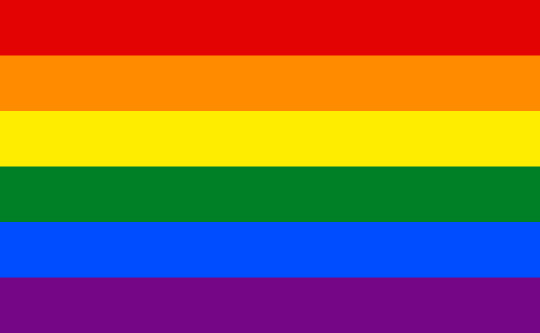
We ain’t starting with an easy one. Questioning is the period of time a person can go through to sort out the ideas of gender, sexual identity and/or sexual orientation. It is a process of exploration for people not sure of themselves (which is a fair feeling) and uncomfortable with the idea of social queer labels.
If you’re looking for a particular branch of people who could fall into that category, look no further than teenagers. At a time when your body is changing, your hormones are showing, and society still doesn’t put forward the idea that being Queer is acceptable, one might feel a great deal of confusion and uncertainty. Kids right now promote the right to sexual fluidity and I think that’s great. I just called them kids. I feel like a grandpa.
The concept of sexual fluidity available to someone who doesn’t want to constraint him/her/themself in a subcategory is theoretically extremely healthy for the mind, helping seeing things clearer in the future.
I as in INTERSEX
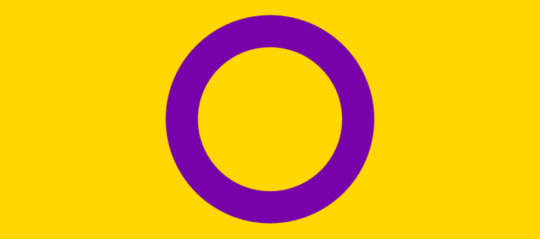
Well, I’ve already talked a lot about Intersex people in previous articles, as it is so connected in its History to the lives of Transgender people (so read the articles from June 24th on Trans Identity and the June 9th on the differences between Sex, Sexuality and Gender Identity if you’re interested).
I’ll do a sum up. Intersex people are individuals born with any of several variation in sex characteristics (chromosomes, sex hormones, genitals) and who do not fit the binary definitions of male or female bodies. Do not use the term “hermaphrodite” because if you do, you’re a hateful asshole.
It’s a biological specificity that has long been ignored by the medical and social scene, giving them little to know coverage to actually build a proper gender identity up until recently. There’s a whole campaign right now to stop forced surgeries on Intersex infants as they are treated as wrong doings from nature that should be corrected. They shouldn’t. Binary notions of life has to be corrected. As the same for forced sterilization on transgender people, modifying the sex characteristics of an individual without his/her/them consent is a Human Rights violation.
The existence of Intersex people is still not up to date in the world but progress has been made with gender classification on legal documents.
Finally, being an Intersex individual does not make you automatically homosexual or bisexual. It’s a gender identity that has nothing to do with sexual orientation, giving to some arguments that they should not be included in our community. Fuck those people.
But let’s not forget that as part of our community, we need to make an effort towards you in understanding your identity, include you in general conversations and fight for your individual rights that sometimes have little to no relations to ours. Let’s not repeat the errors of this heterosexual society, please.
A as in ASEXUAL
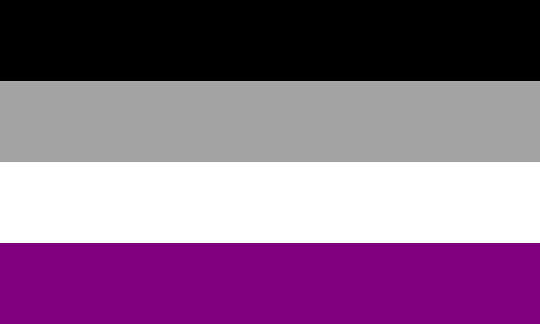
Good god, so much controversy over that one.
Asexuality is the lack of sexual attraction to others, low or absent interest or desire for sexual activity. To make shit clear to everyone, it is considered a sexual orientation, although the primal idea of it is that there’s no sexual orientation to begin with. Although as in every sexuality (or lack of), there are levels and degrees of what being asexual means to someone.
The acceptance of Asexuality is relatively new to the scientific community and to the world, mostly since the internet was invented and people started sharing their personal struggles (as they were deemed struggles in the eyes of society).
More than any other term, asexuality seems to have a big question mark in the minds of people. Well, as sexual beings mostly driven by our urges, it’s hard to comprehend a world where no of this is part of the day-to-day mental conversation. The Asexual Visibility and Education Network (AVEN) has a great thing to say about the words Asexual :
“There is no litmus test to determine if someone is Asexual. Asexuality is like any other identity — at its core, it’s just a word that people use to help figure themselves out. if at any point someone finds the word Asexual useful to describe themselves, we encourage them to use it for as long at it makes sense to do so”.
Words of preaching that can be applied to any identity in our supposedly inclusive rainbow.
Anyway, it’s a complex question that can go to various scenarios. Someone Asexual might engage in romantic relationships, other might not. They could have sex in order to satisfy their partners, but they probably wouldn’t take any pleasure out of it. Maybe they masturbate, maybe they don’t. The point is — Their sex drive is not our businesses. We don’t need to know what you do in your down time.
Labels that can be adopted by Asexual people can also include Aromantic, Biromantic, Heteromantic, Homoromantic, Panromantic — with the acknowledgment of “sexual” orientation but lack of lust towards someone else. See ? There’s also Gray-romantic, Demiromantic, Demisexual, Semisexual, Friend-Focused.
Queer people, know that Asexual as their places among our ranks, as their can be subjected to as much vile discriminations if out as the rest of us. More importantly, there’s currently no major legislation focused on Asexuality and no media exposure of any kind.
Another A as in ALLY

Also sometimes known as “SA” for Straight Allies. Usually cisgender heterosexual people who supports equal rights, gender equality, social movements and are in opposition with homophobia, biphobia, transphobia. I don’t have a lot to say about Allies.
They’re good. The more we have, the better.
Just don’t confuse being open to being an Ally. Being a Ally means make actual changes into your environment towards Equality. It’s not just saying that you have tons of gay friends and “they’re so much fun, I love them!”.
Uh uh. It can be activism. It can be protests and articles and petitions and working for LGBT groups. Sure. Do that if you’re into it.
I’m not an activist myself. I ain’t gonna judge you if you don’t want to be socially active for us.
But you can be an ally by first of all, listen. Not just to us but to all the shit that can come out of your damn mouth that are homophobic and you don’t even realize it.
Be ready for being taken back to school, people. Because the struggle is sometimes real. So real that some Queer people don’t want to educate straight people. I’m willing to but only if I feel like the person can really get it. I quickly know if they are or not.
Don’t use our reclaimed slurs. Don’t “Guuuurl Okrrrrul Death Drop” us for the sake of comedy. As a gay man, I’m not even sure I can do it myself since it’s been part of the drag world. Yes, cultural appropriation inside the Queer community is a thing. Look it up.
Anyway, Ally in the acronym ? hmm, debatable, even for me. Maybe an honorary title on the side ?
C as in CURIOUS
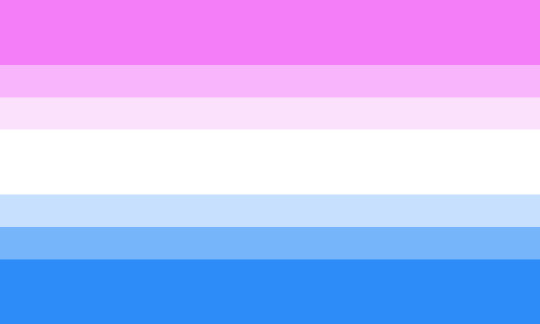
Arf, nop. I don’t agree. Next.
T as in TRANSEXUAL
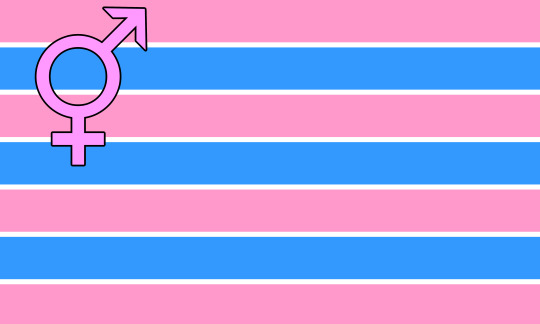
Already covered the Transexual identity in the June 14th article.
Go read this one, sucker.
P as in POLYAMOROUS
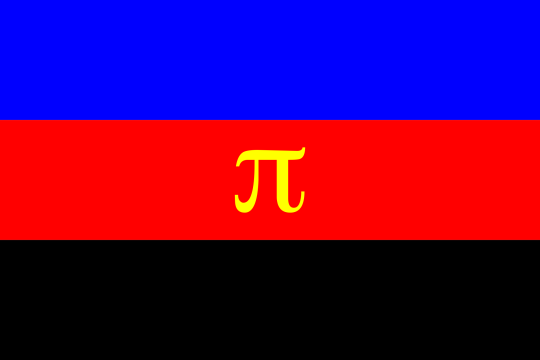
The practice of/desire for intimate relationships with more than one partner. Not to be confused with cheating as a polyamorous is made aware by all partners involved. It’s been described as a “consensual, ethical and responsible non-monogamy” philosophy/sexual identity.
Those identities are so exciting to talk about.
A polyamorous individual believes in an open relationship and rejects the view that sexual and relational exclusivity are necessary for deep, committed, long-term loving relationships. It’s not just about being sexually attracted to other people while in a relationship and acting on it, there’s real values such as love, intimacy, honesty and integrity in the process. Also a healthy position on non-possessiveness that I admire greatly.
Many social factors enter into consideration when it comes to polyamorous identity. The disillusionment with monogamy, illustrated with cheating and divorce from previous generations. A need for independence and equality, sometimes driven in a woman with feminism beliefs. You don’t need a man and you can do your own choices. Be as free as a man has been for thousands of years. Most of all, there’s this belief than human beings are not monogamous to begin with and to impose it on people is madness.
The interest thing about polyamorous identity is not really the details of the relationships but the fact that it is not an identity or sexuality per say, but a companion piece to some of them. You can be poly and Straight, Poly and Trans and a Lesbian. Off course, as most of the other categories, it is not widely accepted by society and until recently, rarely talked about.
I have a feeling it’s about to change.
One of my friends came out to me as polyamorous. I mean, she didn’t actually come out but the fact that she openly talked about it surprised me and then delighted me.
Not to be confused with Bigamy, which with being married to multiple partners. Not very common on western countries but forms of judicial recognition of multiple non marital partners are here and there, most notably in parts of the States.
P as in PANSEXUAL

Already did that one at length on the June 20th article on Bisexuality.
No need to repeat myself that much.
2 as in TWO-SPIRIT
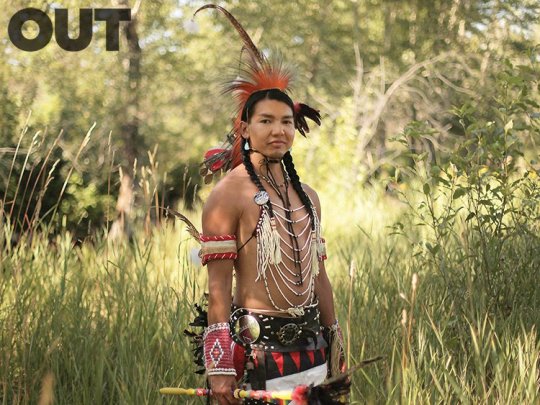
That one you’ve never heard of. Right ?
It is a modern, pan-Indian, umbrella term used by some indigenous North American tribes to describe Native People in their communities who fulfill a third-gender (or other gender — variant) ceremonial role in their cultures. The term was created in 1990 (birth year) in Winnipeg by Lesbian and Gay indigenous gathered for the occasion, as a way to differentiate First Nations people from non-Native Queer Community people.
The concept of Two-Spirit has been around for a long, long time but it used to have another name : Berdache. It was thought to be replaced as it is considered outdated and offensive (from the arabic “Bardaj” that means “slave”, the french Berdache that means “passive” and Italian “Bardassa” that means either “young prostitute” or “brat” and primally focuses on transgender folks and not other areas of the now-named Two-Spirit).
Two-Spirit is not considered to be the same as being a Gay Native American. Yes, Two-Spirit people can fall in love with people of their same gender, or genderfuck conventions of what it means to be a man or a woman, but it’s way more than that. The term is meant to carry on the traditions of Indigenous people, too broad to explain them all here as each tribe has their own little definitions of what a Two-Spirit individual is.
For more comprehensive information, you can watch Lydia Nibley’s 2009 documentary feature called Two Sprits. It focused on the murder of 16 year-old Navajo Fred Martinez, described by his mother as “nadleeh” or “half woman, half man”. But careful, it doesn’t mean exactly what you think it means.
And finally
Q as in QUEER

This one’s easy. It’s us all. It’s an umbrella term to represent anyone in the Queer community. We’re a lot of categorized minorities in need of regroupment and that’s the easiest way to do it.
I actually love the word Queer. It’s just an empowering word due its directness and History.
It appeared around the 16th Century to talk about things that are “strange”, “odd”, “peculiar”, “eccentric”. Perfect fit. It later implied a feeling of suspicion and unwellness. It took 300 years for the word to get use in a pejorative way towards sexual differences. It was that or “invert”. Both are extremely fun.
For almost a century, being called “Queer” was probably the worst. Well, Faggot isn’t a good one either but you get my drift. In the late 80s, the word started to be reclaimed as a neutral or positive self-identity by LGBTQ+ people.
An activist organization to fight anti-gay violence called Queer Nation was created in 1990 (birth year, AGAIN!). I believe it to be still active and alive in some capacity somewhere in America. It also seemed important at the time to find a word that wasn’t so narrow in scope (as “Gay” is) and as the AIDS Epidemic was baptized “The Gay Cancer”, we were truly in need of a rebranding intervention.
But that rebranding didn’t came without its challenges. With a new name came a new attitude, one that rejected the principles of assimilation into heteronormative society. The idea of marriage, adoption, service were banned from what was known the Queer movement in the 90s (while the “Gay” movement was still very much alive and willing to find new rights to Queer people).
I didn’t live through this and I only have my perception of the word. I know some of y’all reject that term as you deem it offensive and self-deprecating. Some of you don’t appreciate the political vibe it brought to the community and the divide in ideas that followed.
I only know that we cannot keep adding letters to our acronym. Ain’t nobody got time to say all those letters. We need to compromise, people. Yes, it’s a bad word. Now, it’s OURS. Being gay is political. They MADE IT political by beating us, torturing us, arresting us, killing us.
They wanted to insult us. We take it and we roll with it with Pride.
So, are we good now ? Have I covered them all ?

Nop, I forgot to talk about Gender-Fluid, Non-Binary people (or Gender Queer), Bigender, Trigender, Pangender. Androgyne. Gender Bender. Third Gender. Androsexual, Gynephilia, Transvestite…
Time for you to make your own damn research.
I still have four more articles to right and just so you know, I won’t use the term “LGBTQ+” anymore. I’ll say Queer as nothing else as of now.
Position cleared.
0 notes